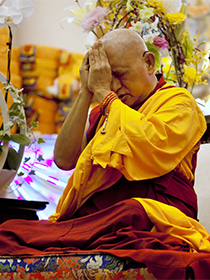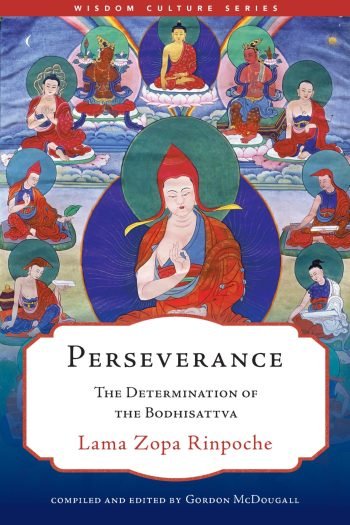- Home
- FPMT Homepage
Foundation for the Preservation of the Mahayana Tradition
The FPMT is an organization devoted to preserving and spreading Mahayana Buddhism worldwide by creating opportunities to listen, reflect, meditate, practice and actualize the unmistaken teachings of the Buddha and based on that experience spreading the Dharma to sentient beings. We provide integrated education through which people’s minds and hearts can be transformed into their highest potential for the benefit of others, inspired by an attitude of universal responsibility and service. We are committed to creating harmonious environments and helping all beings develop their full potential of infinite wisdom and compassion. Our organization is based on the Buddhist tradition of Lama Tsongkhapa of Tibet as taught to us by our founders Lama Thubten Yeshe and Lama Thubten Zopa Rinpoche.
- Willkommen
Die Stiftung zur Erhaltung der Mahayana Tradition (FPMT) ist eine Organisation, die sich weltweit für die Erhaltung und Verbreitung des Mahayana-Buddhismus einsetzt, indem sie Möglichkeiten schafft, den makellosen Lehren des Buddha zuzuhören, über sie zur reflektieren und zu meditieren und auf der Grundlage dieser Erfahrung das Dharma unter den Lebewesen zu verbreiten.
Wir bieten integrierte Schulungswege an, durch denen der Geist und das Herz der Menschen in ihr höchstes Potential verwandelt werden zum Wohl der anderen – inspiriert durch eine Haltung der universellen Verantwortung und dem Wunsch zu dienen. Wir haben uns verpflichtet, harmonische Umgebungen zu schaffen und allen Wesen zu helfen, ihr volles Potenzial unendlicher Weisheit und grenzenlosen Mitgefühls zu verwirklichen.
Unsere Organisation basiert auf der buddhistischen Tradition von Lama Tsongkhapa von Tibet, so wie sie uns von unseren Gründern Lama Thubten Yeshe und Lama Thubten Zopa Rinpoche gelehrt wird.
- Bienvenidos
La Fundación para la preservación de la tradición Mahayana (FPMT) es una organización que se dedica a preservar y difundir el budismo Mahayana en todo el mundo, creando oportunidades para escuchar, reflexionar, meditar, practicar y actualizar las enseñanzas inconfundibles de Buda y en base a esa experiencia difundir el Dharma a los seres.
Proporcionamos una educación integrada a través de la cual las mentes y los corazones de las personas se pueden transformar en su mayor potencial para el beneficio de los demás, inspirados por una actitud de responsabilidad y servicio universales. Estamos comprometidos a crear ambientes armoniosos y ayudar a todos los seres a desarrollar todo su potencial de infinita sabiduría y compasión.
Nuestra organización se basa en la tradición budista de Lama Tsongkhapa del Tíbet como nos lo enseñaron nuestros fundadores Lama Thubten Yeshe y Lama Zopa Rinpoche.
A continuación puede ver una lista de los centros y sus páginas web en su lengua preferida.
- Bienvenue
L’organisation de la FPMT a pour vocation la préservation et la diffusion du bouddhisme du mahayana dans le monde entier. Elle offre l’opportunité d’écouter, de réfléchir, de méditer, de pratiquer et de réaliser les enseignements excellents du Bouddha, pour ensuite transmettre le Dharma à tous les êtres. Nous proposons une formation intégrée grâce à laquelle le cœur et l’esprit de chacun peuvent accomplir leur potentiel le plus élevé pour le bien d’autrui, inspirés par le sens du service et une responsabilité universelle. Nous nous engageons à créer un environnement harmonieux et à aider tous les êtres à épanouir leur potentiel illimité de compassion et de sagesse. Notre organisation s’appuie sur la tradition guéloukpa de Lama Tsongkhapa du Tibet, telle qu’elle a été enseignée par nos fondateurs Lama Thoubtèn Yéshé et Lama Zopa Rinpoché.
Visitez le site de notre Editions Mahayana pour les traductions, conseils et nouvelles du Bureau international en français.
Voici une liste de centres et de leurs sites dans votre langue préférée
- Benvenuto
L’FPMT è un organizzazione il cui scopo è preservare e diffondere il Buddhismo Mahayana nel mondo, creando occasioni di ascolto, riflessione, meditazione e pratica dei perfetti insegnamenti del Buddha, al fine di attualizzare e diffondere il Dharma fra tutti gli esseri senzienti.
Offriamo un’educazione integrata, che può trasformare la mente e i cuori delle persone nel loro massimo potenziale, per il beneficio di tutti gli esseri, ispirati da un’attitudine di responsabilità universale e di servizio.
Il nostro obiettivo è quello di creare contesti armoniosi e aiutare tutti gli esseri a sviluppare in modo completo le proprie potenzialità di infinita saggezza e compassione.
La nostra organizzazione si basa sulla tradizione buddhista di Lama Tsongkhapa del Tibet, così come ci è stata insegnata dai nostri fondatori Lama Thubten Yeshe e Lama Zopa Rinpoche.
Di seguito potete trovare un elenco dei centri e dei loro siti nella lingua da voi prescelta.
- 欢迎 / 歡迎
简体中文
“护持大乘法脉基金会”( 英文简称:FPMT。全名:Foundation for the Preservation of the Mahayana Tradition) 是一个致力于护持和弘扬大乘佛法的国际佛教组织。我们提供听闻,思维,禅修,修行和实证佛陀无误教法的机会,以便让一切众生都能够享受佛法的指引和滋润。
我们全力创造和谐融洽的环境, 为人们提供解行并重的完整佛法教育,以便启发内在的环宇悲心及责任心,并开发内心所蕴藏的巨大潜能 — 无限的智慧与悲心 — 以便利益和服务一切有情。
FPMT的创办人是图腾耶喜喇嘛和喇嘛梭巴仁波切。我们所修习的是由两位上师所教导的,西藏喀巴大师的佛法传承。
繁體中文
護持大乘法脈基金會”( 英文簡稱:FPMT。全名:Found
ation for the Preservation of the Mahayana Tradition ) 是一個致力於護持和弘揚大乘佛法的國際佛教組織。我們提供聽聞, 思維,禪修,修行和實證佛陀無誤教法的機會,以便讓一切眾生都能 夠享受佛法的指引和滋潤。 我們全力創造和諧融洽的環境,
為人們提供解行並重的完整佛法教育,以便啟發內在的環宇悲心及責 任心,並開發內心所蘊藏的巨大潛能 — 無限的智慧與悲心 – – 以便利益和服務一切有情。 FPMT的創辦人是圖騰耶喜喇嘛和喇嘛梭巴仁波切。
我們所修習的是由兩位上師所教導的,西藏喀巴大師的佛法傳承。 察看道场信息:
- FPMT Homepage
- News/Media
-
- Study & Practice
-
-
- About FPMT Education Services
- Latest News
- Programs
- New to Buddhism?
- Buddhist Mind Science: Activating Your Potential
- Heart Advice for Death and Dying
- Discovering Buddhism
- Living in the Path
- Exploring Buddhism
- FPMT Basic Program
- FPMT Masters Program
- FPMT In-Depth Meditation Training
- Maitripa College
- Lotsawa Rinchen Zangpo Translator Program
- Universal Education for Compassion & Wisdom
- Online Learning Center
-
- Prayers & Practice Materials
- Overview of Prayers & Practices
- Full Catalogue of Prayers & Practice Materials
- Explore Popular Topics
- Benefiting Animals
- Chenrezig Resources
- Death & Dying Resources
- Lama Chopa (Guru Puja)
- Lama Zopa Rinpoche: Compendium of Precious Instructions
- Lama Zopa Rinpoche: Life Practice Advice
- Lama Zopa Rinpoche Practice Series
- Lamrim Resources
- Mantras
- Prayer Book Updates
- Purification Practices
- Sutras
- Thought Transformation (Lojong)
- Audio Materials
- Dharma Dates - Tibetan Calendar
- Translation Services
- Publishing Services
- Ways to Offer Support
- Prayers & Practice Materials
-
- Teachings and Advice
- Find Teachings and Advice
- Lama Zopa Rinpoche Advice Page
- Lama Zopa Rinpoche: Compendium of Precious Instructions
- Lama Zopa Rinpoche Video Teachings
- ༧སྐྱབས་རྗེ་བཟོད་པ་རིན་པོ་ཆེ་མཆོག་ནས་སྩལ་བའི་བཀའ་སློབ་བརྙན་འཕྲིན།
- Podcasts
- Lama Yeshe Wisdom Archive
- Buddhism FAQ
- Dharma for Young People
- Resources on Holy Objects
- Teachings and Advice
-
-
*If a menu item has a submenu clicking once will expand the menu clicking twice will open the page.
-
-
- Centers
-
- Teachers
-
- Projects
-
-
-
-
*If a menu item has a submenu clicking once will expand the menu clicking twice will open the page.
-
-
- FPMT
-
-
-
-
-
Renunciation of samsara is not only the business of monks and nuns. Whoever is seeking liberation or enlightenment needs renunciation of samsara.
Lama Thubten Yeshe
-
-
-
- Shop
-
-
-
The Foundation Store is FPMT’s online shop and features a vast selection of Buddhist study and practice materials written or recommended by our lineage gurus. These items include homestudy programs, prayers and practices in PDF or eBook format, materials for children, and other resources to support practitioners.
Items displayed in the shop are made available for Dharma practice and educational purposes, and never for the purpose of profiting from their sale. Please read FPMT Foundation Store Policy Regarding Dharma Items for more information.
-
-
Lama Zopa Rinpoche News and Advice
22
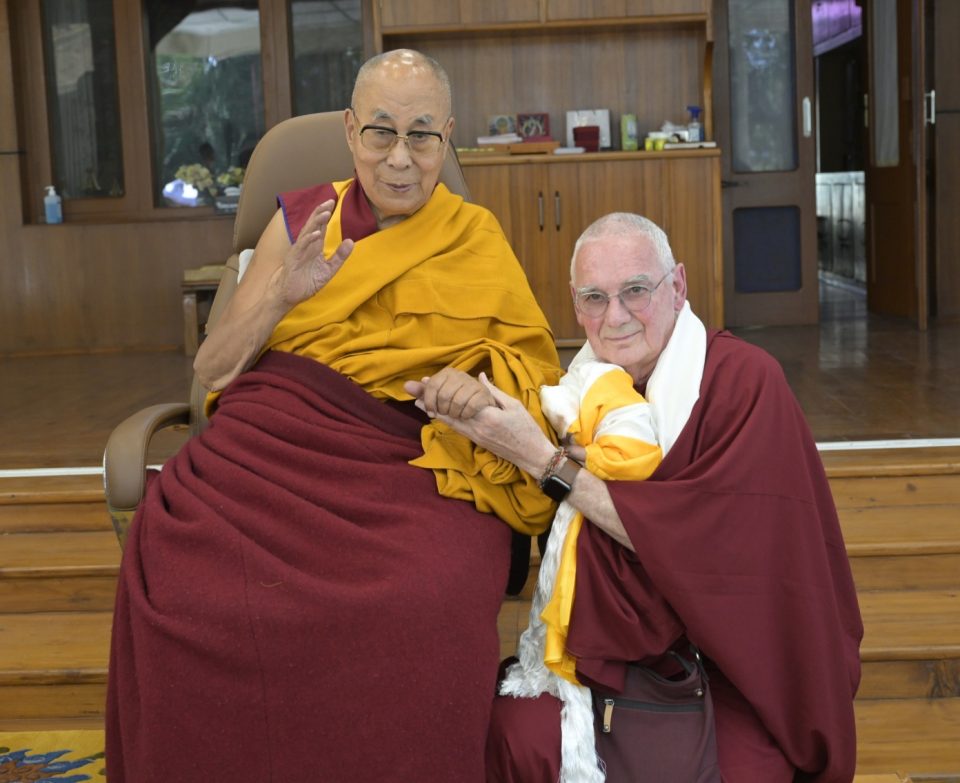
Ven. Roger Kunsang meeting with His Holiness the Dalai Lama, May 17, 2024. Photo courtesy of the Office of His Holiness the Dalai Lama.
We are happy to announce that we have received new precious advice from His Holiness the Dalai Lama regarding practices for creating the causes for the Lama Zopa Rinpoche’s swift return. Venerable Roger Kunsang met with His Holiness during his recent visit to Dharamsala, India. His Holiness explained that it is important to continue with practices as previously advised as well as protector prayers and practices outlined below.
All of these practices listed below (except for the Retreat Prayer book) are available as one-click downloads without the need to log into a Foundation Store account. Simply select the “one-click download” link located above the description of each practice.
As Previously Advised:
- To recite Chanting the Names of Noble Manjushri as much as possible.
New Advice!
- Perform rituals invoking the four activities of the Dharma protectors Mahakala, Kalarupa (i.e. Dharmaraja), and Shri Devi (i.e. Palden Lhamo)
Do the Palden Lhamo kangso and Mahakala kangso if you are able to and have received an appropriate highest yoga tantra initiation, preferably Yamantaka. Kangso is a “fulfillment and amendment” ritual. Copies of the relevant texts, based on self-generation as Yamantaka, are available on request.
As these elaborate rituals may be more difficult to perform, students can recite the following prayers to the three protectors:
- Praise to Six-Armed Protector Mahakala
- Praise to Achieve the Inner Kalarupa (Dharmaraja)
- Torma Offering to Palden Lhamo
- Praise to Palden Lhamo: Requesting the Four Activities
These prayers can be found in the following booklets:
-
- Protector Prayers booklet arranged by Lama Zopa Rinpoche, pages 5–17
- Retreat Prayer Book, English, pages 284–295 | Italian | Spanish | Vietnamese
Additional Kalarupa ritual:
- Drugchuma, Offering of Sixty-Four Parts to Kalarupa (Yamantaka initiation as requirement)
Additional prayers to Palden Lhamo:
- All-Pervasive Sphere of Great Bliss, Free of Elaboration: Requesting Activities of Palden Lhamo by HH Dalai Lama
- A Daily Practice of Pälden Lhamo which contains praises as well as torma and libation offerings (serkyem) English | Spanish (highest yoga tantra initiation as requirement)
As a reminder, Saka Dawa falls on Thursday, May 23 this year, and this is a wonderful opportunity to practice according to His Holiness’s recent advice since karmic results are multiplied by 300 million times as it commemorates Shakyamuni Buddha’s three major life events, as taught in the vinaya text Treasure of Quotations and Logic.
May all of these collective heartfelt prayers and practices be the cause for Lama Zopa Rinpoche’s swift return and continued guidance.
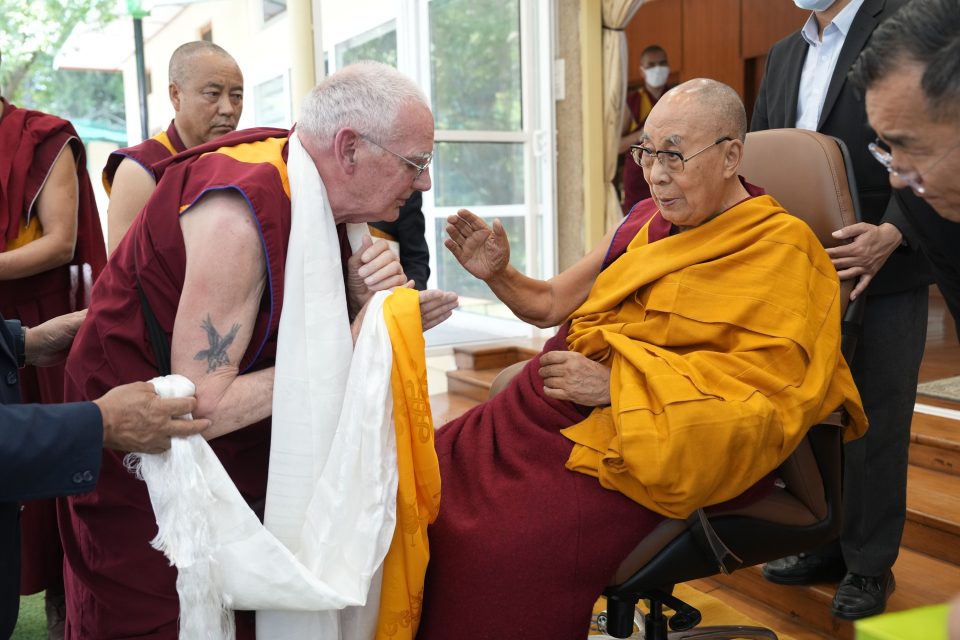
Ven. Roger Kunsang meeting with His Holiness the Dalai Lama on May 17, 2024. Photo courtesy of the Office of His Holiness the Dalai Lama.
Lama Zopa Rinpoche (1945-2023) was the spiritual director of the Foundation for the Preservation of Mahayana Tradition (FPMT), a Tibetan Buddhist organization dedicated to the transmission of the Mahayana Buddhist tradition and values worldwide through teaching, meditation and community service.
7
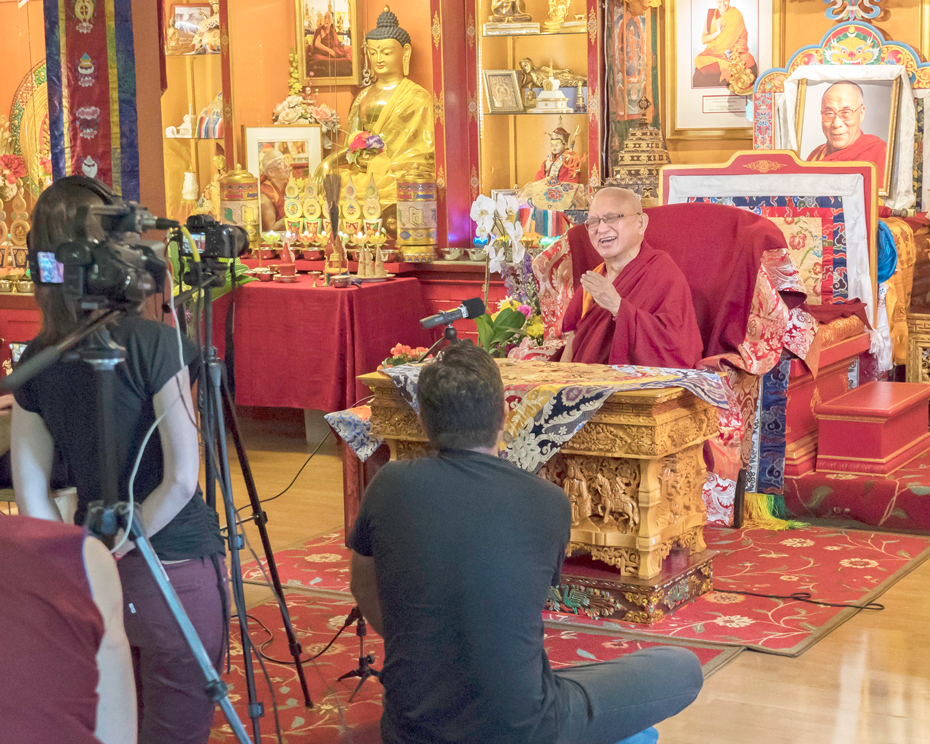
Lama Zopa Rinpoche being interviewed by Wisdom Publication’s Daniel Aitken, Kurukulla Center, Massachusetts, US, August 2018. Photo by Ven. Lobsang Sherab.
In 2018, Wisdom Publications director, Daniel Aitken, spoke with Lama Zopa Rinpoche for over an hour during one of Rinpoche’s visits to Kurukulla Center in Boston, US. This conversation was featured on the Wisdom Podcast later that year. During the interview, Rinpoche speaks on many topics, including stories about his early days as a young monk, how he became a Gelugpa, and how he ended up at Buxa in West Bengal, India, where he met Lama Yeshe. Rinpoche also offers a succinct teaching on emptiness and essential everyday Dharma practice advice.
We are so fortunate that so many precious videos, photos, teachings, and advice were captured of Lama Zopa Rinpoche and this interview is a true treasure.
We invite you to watch this joyful (and at times very funny!) conversation Rinpoche shared with Daniel for the benefit of all.
Please watch Daniel Aitken’s Interview with Lama Zopa Rinpoche:
https://www.youtube.com/watch?v=uQh1yZrj1CM
There are dozens of Wisdom Podcasts available to listen to with accomplished teachers, scholars, and practitioners of Buddhism.
Lama Zopa Rinpoche (1945-2023) was the spiritual director of the Foundation for the Preservation of Mahayana Tradition (FPMT), a Tibetan Buddhist organization dedicated to the transmission of the Mahayana Buddhist tradition and values worldwide through teaching, meditation and community service.
- Tagged: interview, wisdom podcast
30
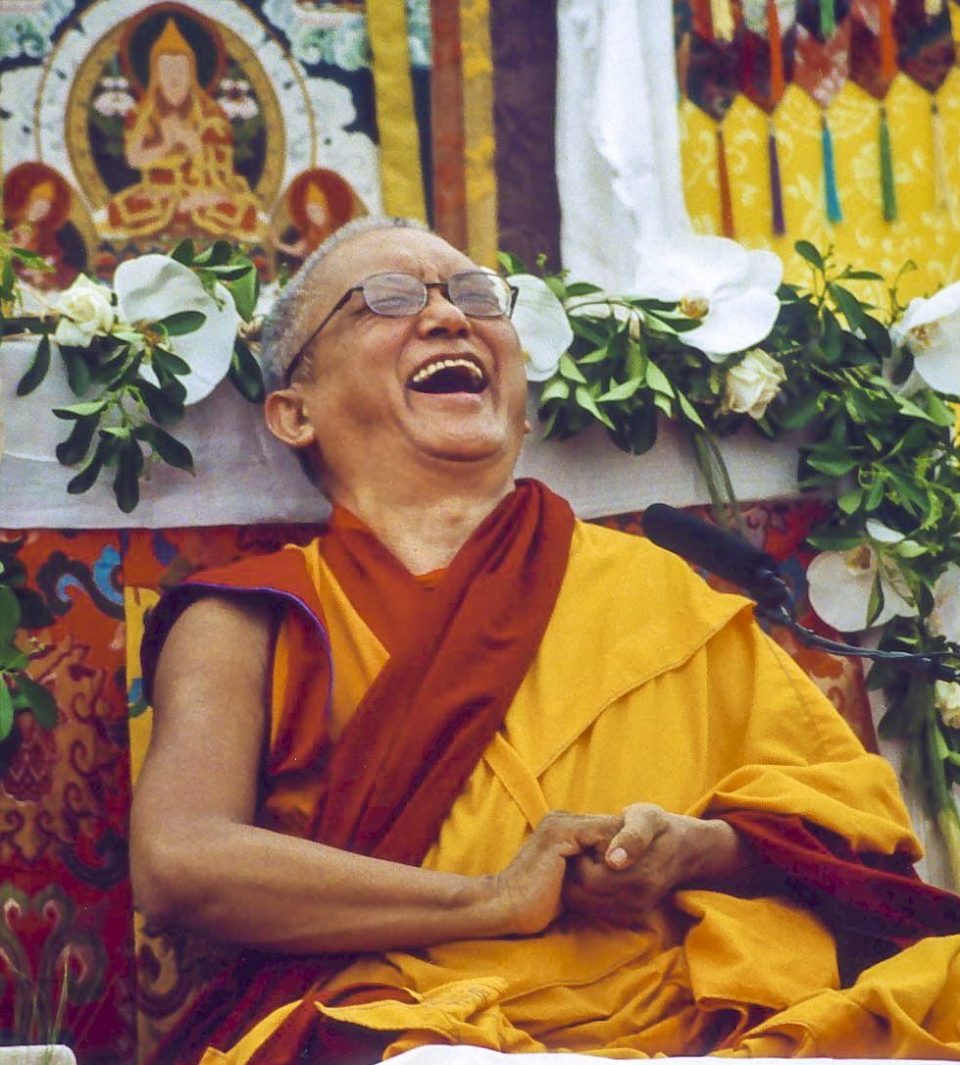
Lama Zopa Rinpoche teaching at the Four Kadampa Deities Retreat, Institut Vajra Yogini, France, 2003. Photo by Ven. Thubten Kunsang.
Recently we shared the addition to our Rinpoche Available Now page of Lama Zopa Rinpoche’s 2003 twenty-three part teachings from a Four Kadampa Deities Retreat offered at Institut Vajra Yogini, France. The retreat focused on the four Kadampa deities, however, Rinpoche taught on a broad range of lamrim topics.
Today we wanted to bring to your attention teaching #3 in this series, “Meditating on the Emptiness in Sound.”
In this teaching Rinpoche discusses a meditation practice focused on the sound of rain, suggesting two meditations: one on the conventional truth of the rain and the other on the emptiness of the rain.
Rinpoche advises to analyze how the sound of rain appears to one’s mind, questioning whether the sound is merely labeled by the mind or if it appears to exist independently from its own side. The correct view, according to the Prasangika school, is that the sound is merely imputed by the mind on the base of the sense of the ear.
Next, meditate on the sound’s hallucinatory nature and its emptiness, recognizing that the sound is not inherently existent and is merely imputed by the mind. The goal is to differentiate between the hallucinatory appearance of the sound and its ultimate nature, emptiness. Meditation on emptiness helps break the root of samsara, but it is crucial to start the practice with bodhicitta motivation to make one’s life most beneficial for sentient beings.
Rinpoche discusses the importance of mindfulness and awareness in daily life, using the lamrim as an antidote to delusions and a means to practice awareness. Sound can be used as an object of meditation to cultivate wisdom and bodhicitta, leading to liberation and enlightenment for oneself and all sentient beings.
We invite you to watch this full video and engage with a lightly edited version of this teaching which is available from the Lama Yeshe Wisdom Archive.
Watch “Meditating on the Emptiness in Sound”
https://www.youtube.com/watch?v=tnO2p255auw
As a reminder, this entire retreat is now available for students to explore as they wish.
Foundation for the Preservation of Mahayana Tradition (FPMT), is a Tibetan Buddhist organization dedicated to the transmission of the Mahayana Buddhist tradition and values worldwide through teaching, meditation and community service.
23
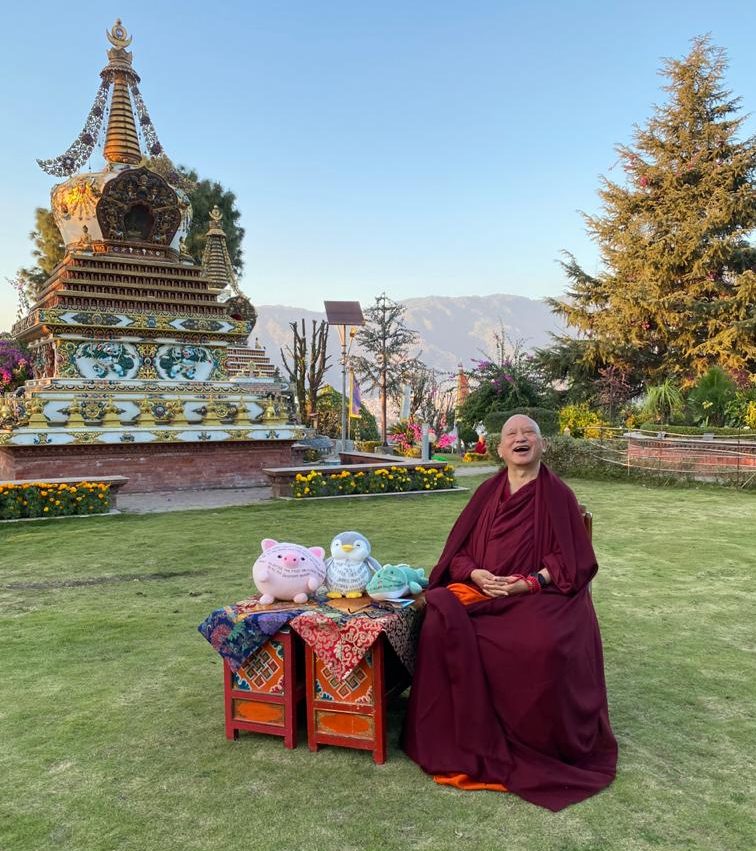
Lama Zopa Rinpoche in the garden at Kopan Monastery accompanied by some friends with Dharma messages, 2020. Photo by Ven. Roger Kunsang. .
Around the beginning of 2020, when all the world was experiencing lockdowns and turmoil due to the covid pandemic, students of Lama Zopa Rinpoche were relieved to receive Rinpoche’s laughter, wisdom, humor, and orientation toward Dharma in the form of a series of video teachings from his room in Kopan Monastery. These teachings came to be known as the thought transformation teaching series, and for many of us, they were truly a lifeline in an extremely uncertain time.
When the fourth video of this series was released, students noticed something interesting coming into view on Rinpoche’s couch and desk. A stuffed monkey, hippo, and elephant; as well as a wooden elephant and model yak had joined Rinpoche for his teaching. As time went on, more and more stuffed friends began appearing in Rinpoche’s room, soon with mantras, embellishments such as eyelashes and eye-liner, and profound (and often hilarious!) Dharma messages.
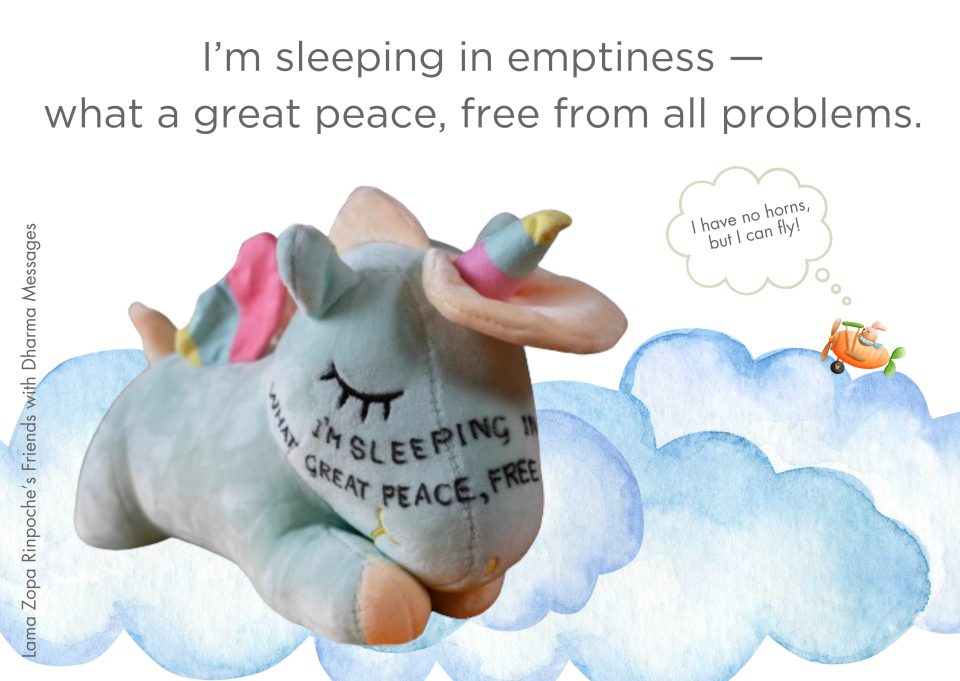
One of the postcards of Lama Zopa Rinpoche’s friends with Dharma messages.
Last year we created a gallery of these friends with Dharma messages, and now we are very happy to share with you a set of seven postcards featuring the animal toys with messages dictated by Rinpoche. These are PDFs suitable for the 148 x 105 mm postcard size printing, but can also be used digitally:
https://shop.fpmt.org/lama-zopa-rinpoches-friends-with-dharma-messages-pdf.html
You can read about the history of this whimsical enlightened activity and enjoy many photos from over the years.
Lama Zopa Rinpoche (1945-2023) was the spiritual director of the Foundation for the Preservation of Mahayana Tradition (FPMT), a Tibetan Buddhist organization dedicated to the transmission of the Mahayana Buddhist tradition and values worldwide through teaching, meditation and community service.
- Tagged: plushy toys
16
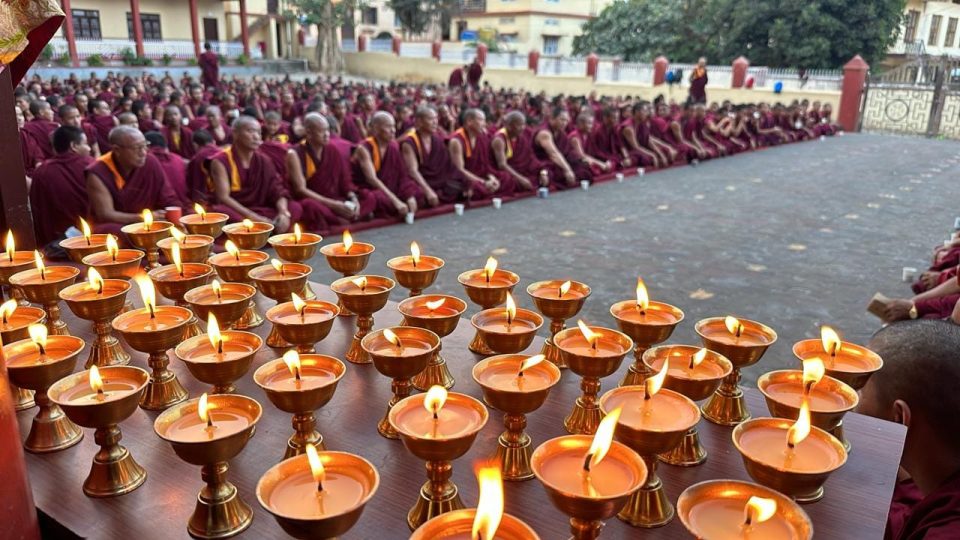
Novice students and teachers of Sera Je Secondary school gathered at the school assembly ground for the special prayer session arranged at the school on the first anniversary puja of Lama Zopa Rinpoche, April 13, 2024. Photo by Sera Je Secondary School.
April 13 marked the one-year anniversary of Lama Zopa Rinpoche showing the aspect of passing away.
At Kopan Monastery, around one thousand participants including high lamas, students, and friends engaged in practice in proximity to Rinpoche’s holy body including His Eminence the 104th Ganden Tripa; Khandro Tseringma Rinpoche; Mingyur Ripoche; Tsoknyi Ripoche; Abbots from Sera Je, Sera Mey, and Segyud Monasteries; Kusho Tengye; Khenrinpoche Geshe Chonyi; Yangsi Rinpoche; Namgyal Rinpoche; Kopan Geshes, Lama Gyupas, and many other monks and nuns; as well as Western students, some members of the FPMT Inc. Board of Directors, representatives from FPMT International Office, and many other local and international friends.
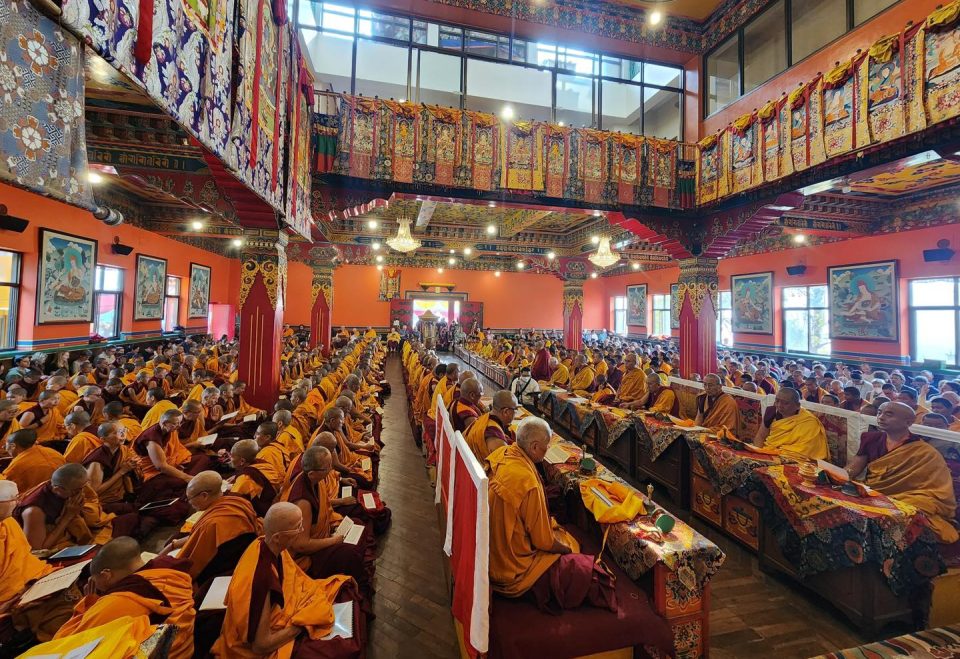
High lamas, students and friends offering prayers for Rinpoche’s swift return. Photo courtesy Kopan Monastery.
At Lawudo Retreat Centre, a two-day puja was offered by Thame Rinpoche, Kyarok Lama, and Charok Tenzin Tinley Rinpoche, and other monks and ngakpas.
FPMT centers, monasteries, and various communities around the world hosted events of pujas and prayers, honoring Rinpoche’s incredibly beneficial life and praying for his swift return. The main practice offered was Heruka Lama Chopa with Tsog Offering.
Today we are sharing some photos of the heartfelt and devoted efforts on April 13 commemorating the anniversary of the passing of our most precious guru.
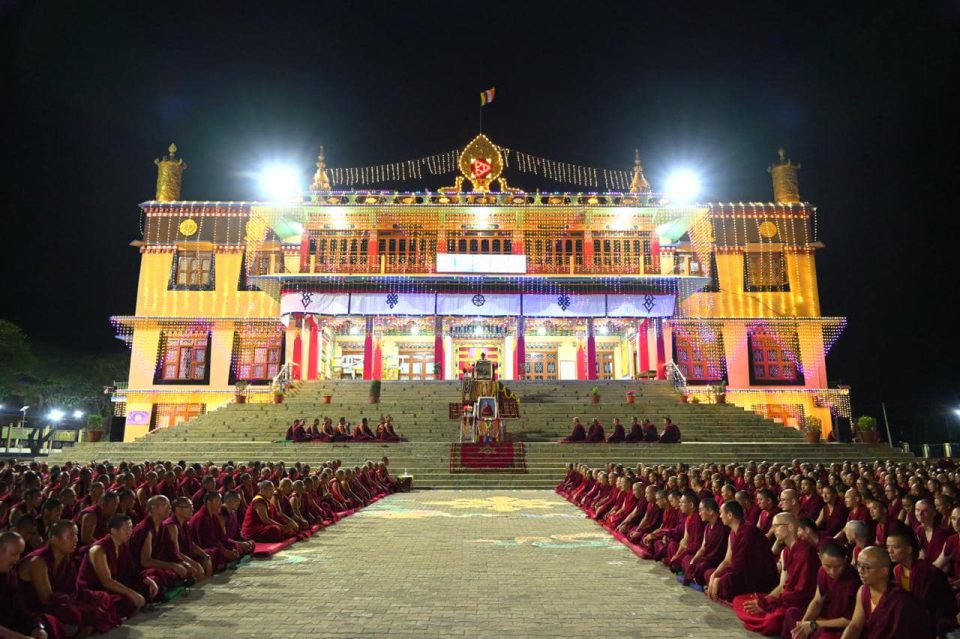
Sera Je Monastery commemorated the first anniversary of Lama Zopa Rinpoche with a special extensive Lama Chopa and Tsog Offering, April 13 2024. Photo by Sera Je Monastery.
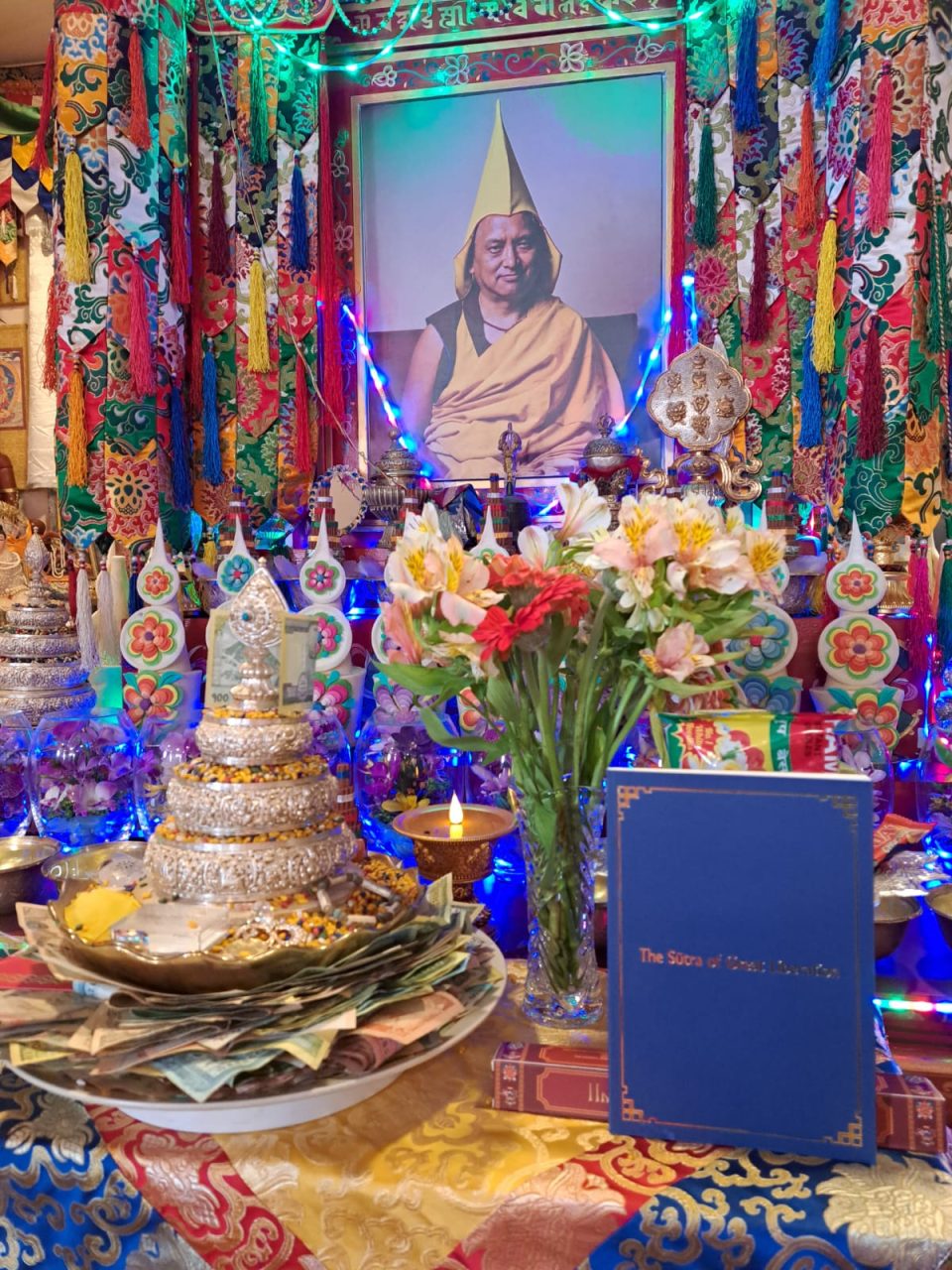
The first copy of a special limited edition of 300 copies of the Sutra of Great Liberation, printed in English by Amitabha Buddhist Centre students for the occasion of the commemoration of Lama Zopa Rinpoche showing the aspect of passing away, was offered to the holy body of Rinpoche at Kopan Monastery, April 12, 2024. Photo courtesy of ABC.
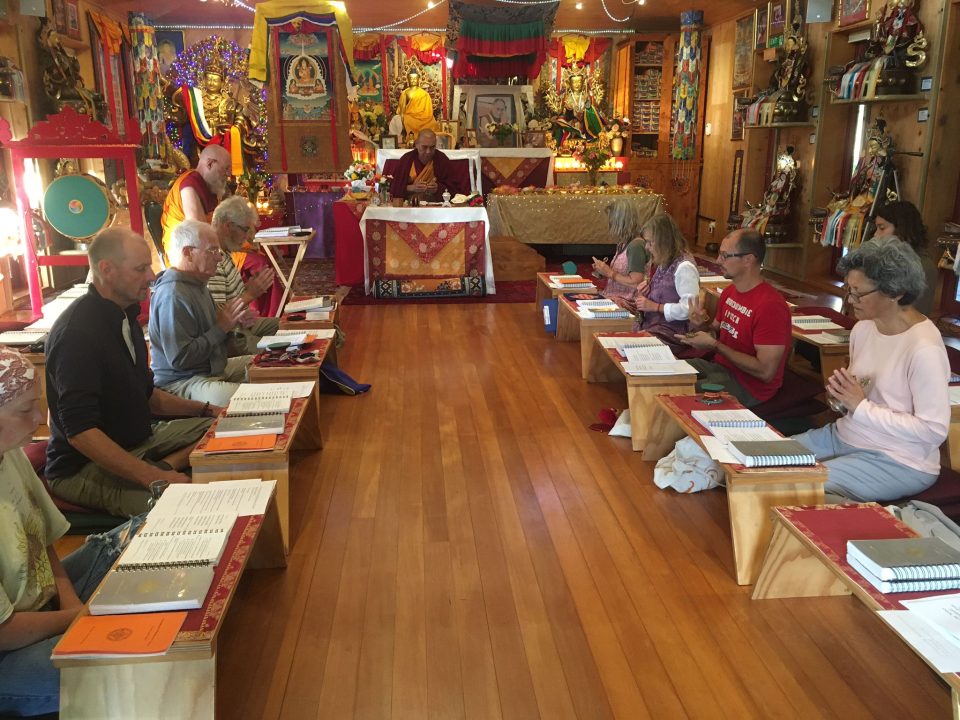
Lama Chopa Tsog and prayers at Chandrakirti Meditation Centre on April 13, 2024. Photo by Chandrakirti Meditation Centre.
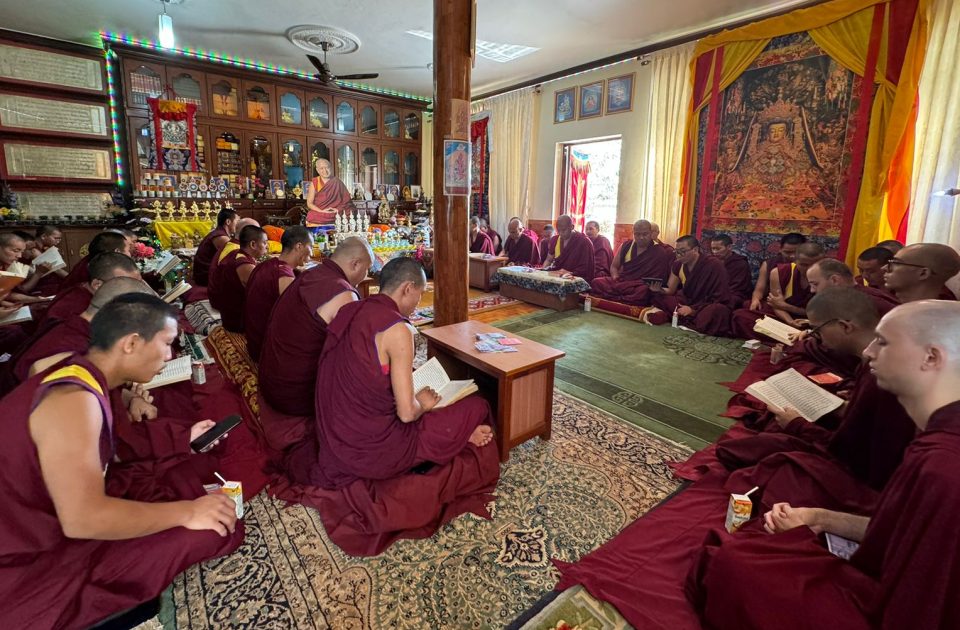
Sera Kopan Sangha pays homage to Lama Zopa Rinpoche on the anniversary of Rinpoche’s showing the aspect of passing away with pujas at Sera Jey Tsawa Khangtsen and Osel Labrang and by making extensive light offerings at Kopan House, Bylakuppe, India, April 13, 2024. Photo by Sera Kopan.
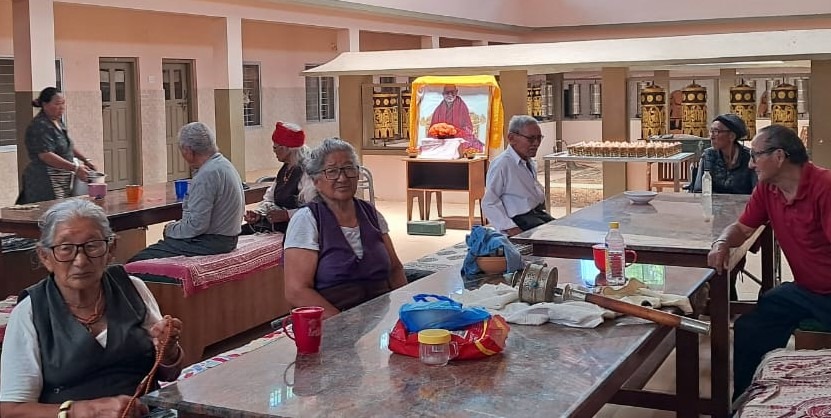
Elders of OPH (Old Peoples’ Home), Dhondenling Tibetan Settlement host prayers for Rinpoche’s swift return on the first anniversary of Lama Zopa Rinpoche’s passing.
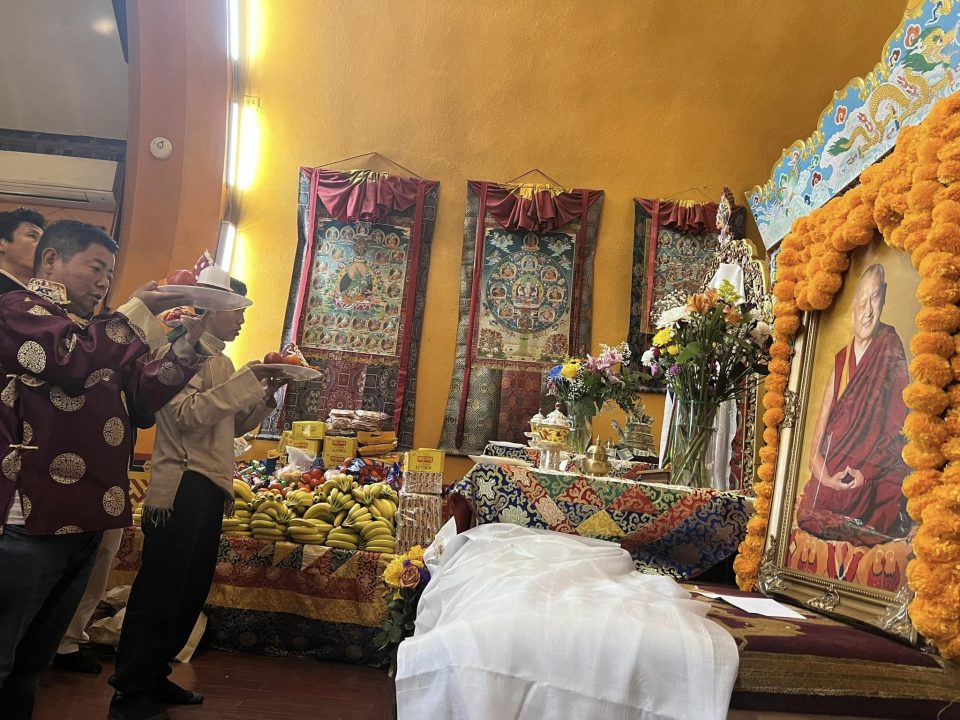
Offering and prayers at Sera Jey Buddhist Culture Center NY, New York, USA, April 13, 2024. Photo by Sera Jey Buddhist Culture Center NY.
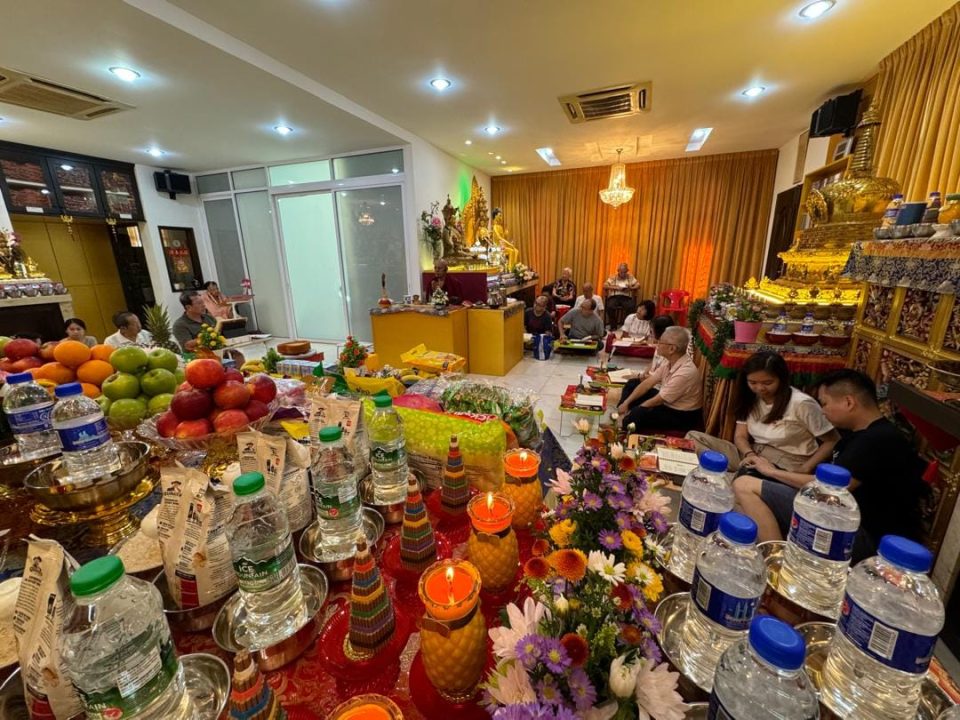
Lama Chopa with thousand tsog and extensive light offerings and recitation of the Chanting the Names of Noble Manjusri at Chokyi Gyaltsen Center, Penang, Malaysia. Photo by Chokyi Gyaltsen.
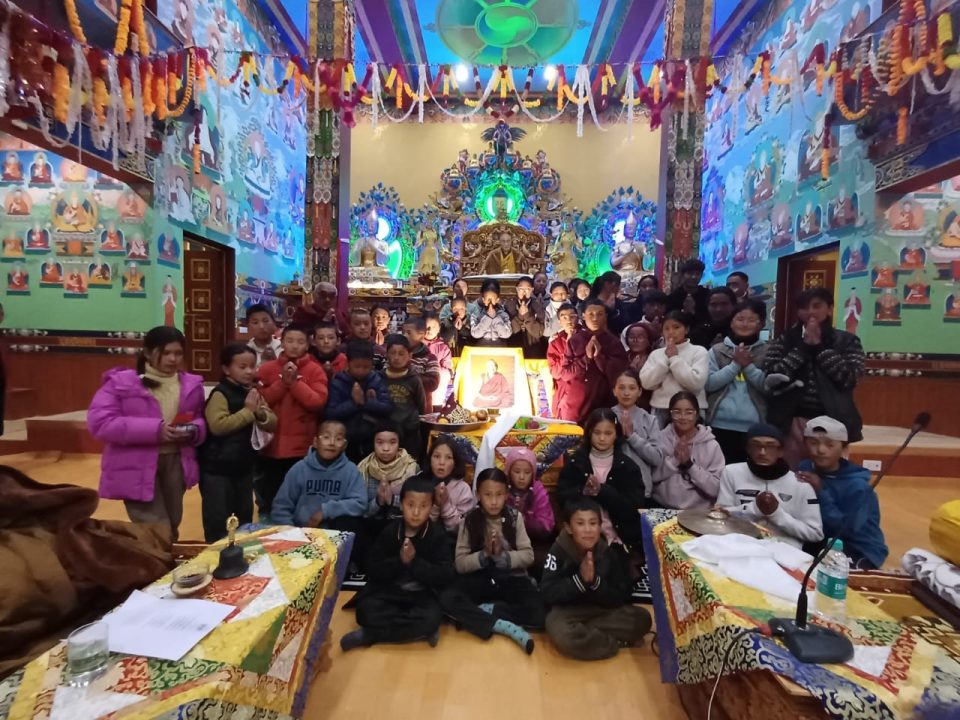
Ngari Institute of Buddhist Dialectics Leh Ladakh held extensive Lama Chopa Tsog, attended by Petuk Monastery monks and Ngari staff and students, April 13, 2024. Photo by Ngawang Yeshi.
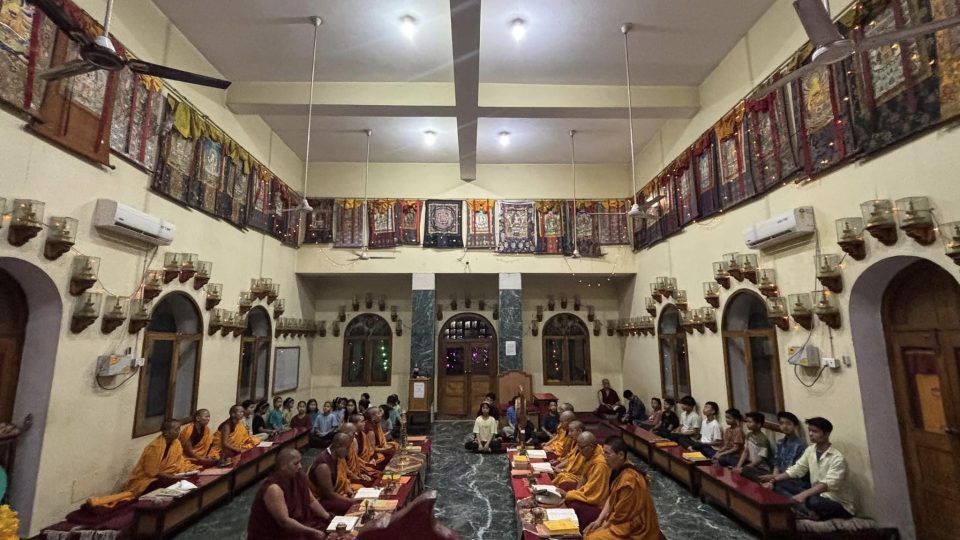
Commemorating the first anniversary of Lama Zopa Rinpoche’s passing away and with Universal Education school for teachers and Chakma students, Tara Temple, Varanasi, India,. Photo by Yulo Koepa Nunnery – Tara Pure Land.
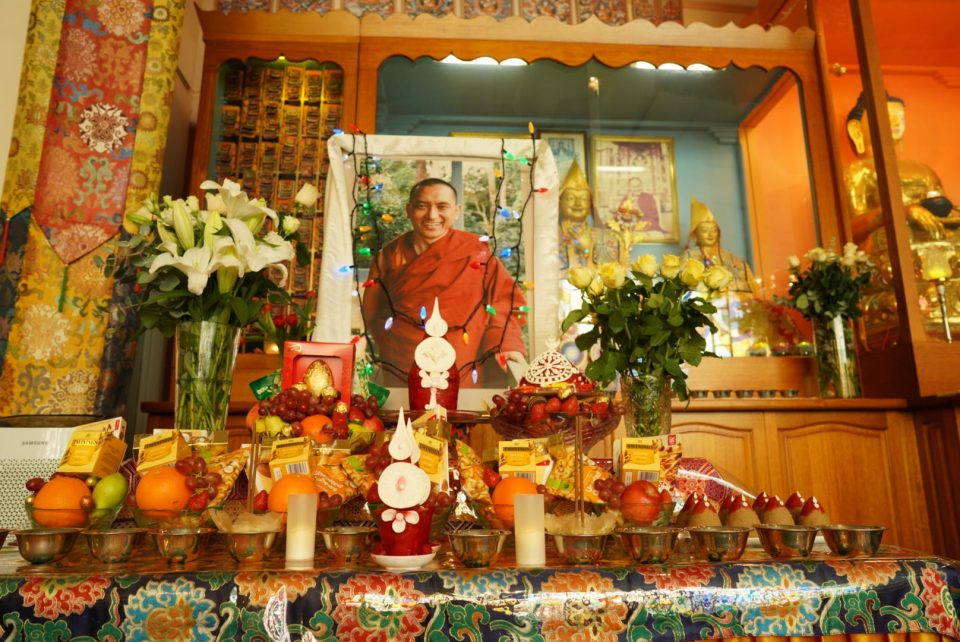
Tara Institute members offered Guru puja and recited Chanting the Names of Noble Manjushri, April 13, 2024. Photo by Tara Institute.
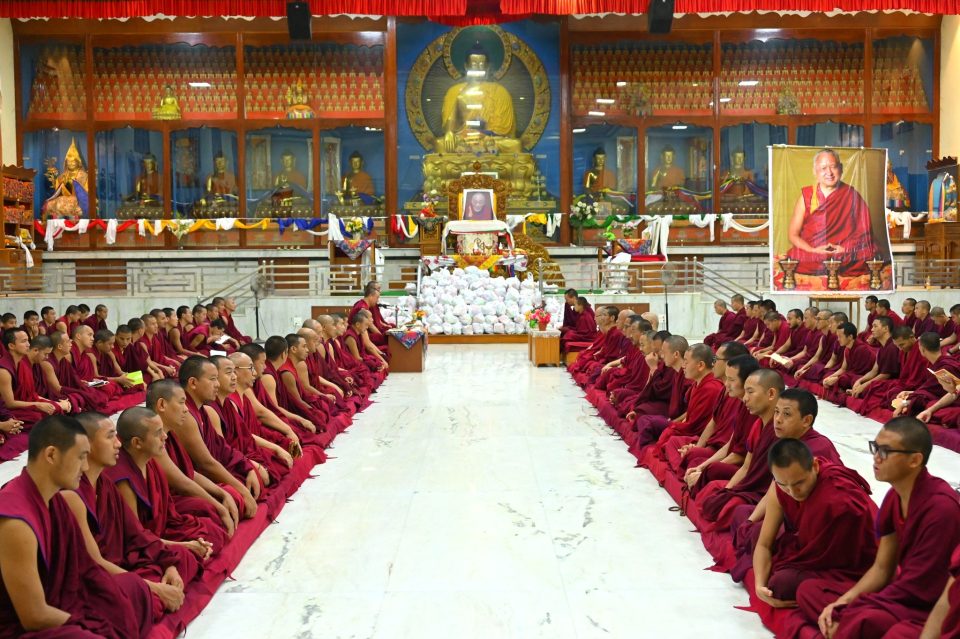
Sera Je Drati Khangtsen commemorated the first anniversary of Venerable Late Lama Zopa Rinpoche with a special extensive Lama Chopa Tsog Offering, April 13, 2024. Photo by Sera Je Drati Khangtsen.
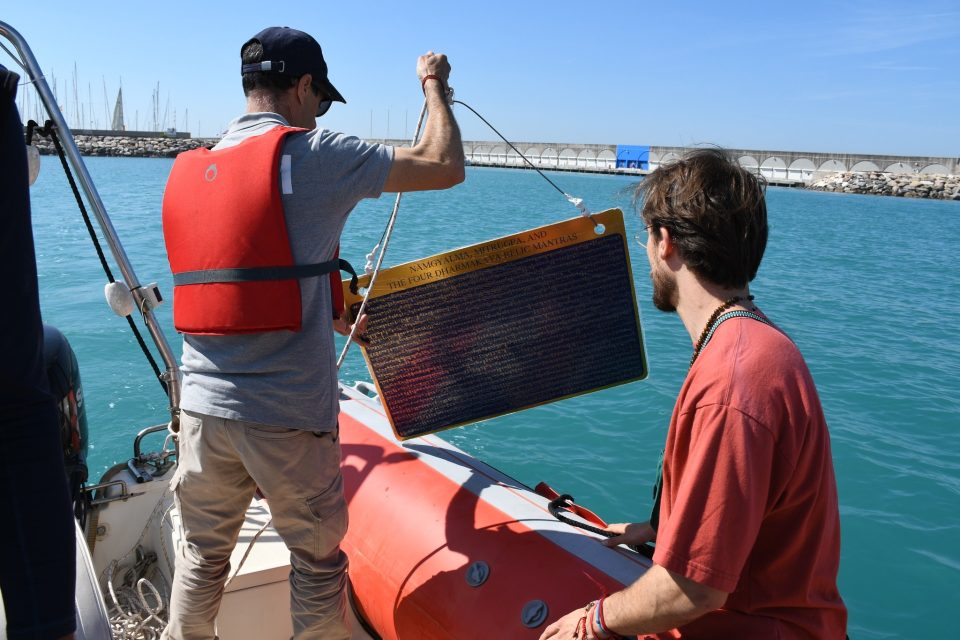
Istituto Lama Tzong Khapa members blessed animals in the ocean on the first anniversary of the passing of Lama Zopa Rinpoche, April 13, and organized a day of commemoration to remember his kindness and create causes for his swift return and His vast future actions. Photo courtesy of ILTK Facebook page.
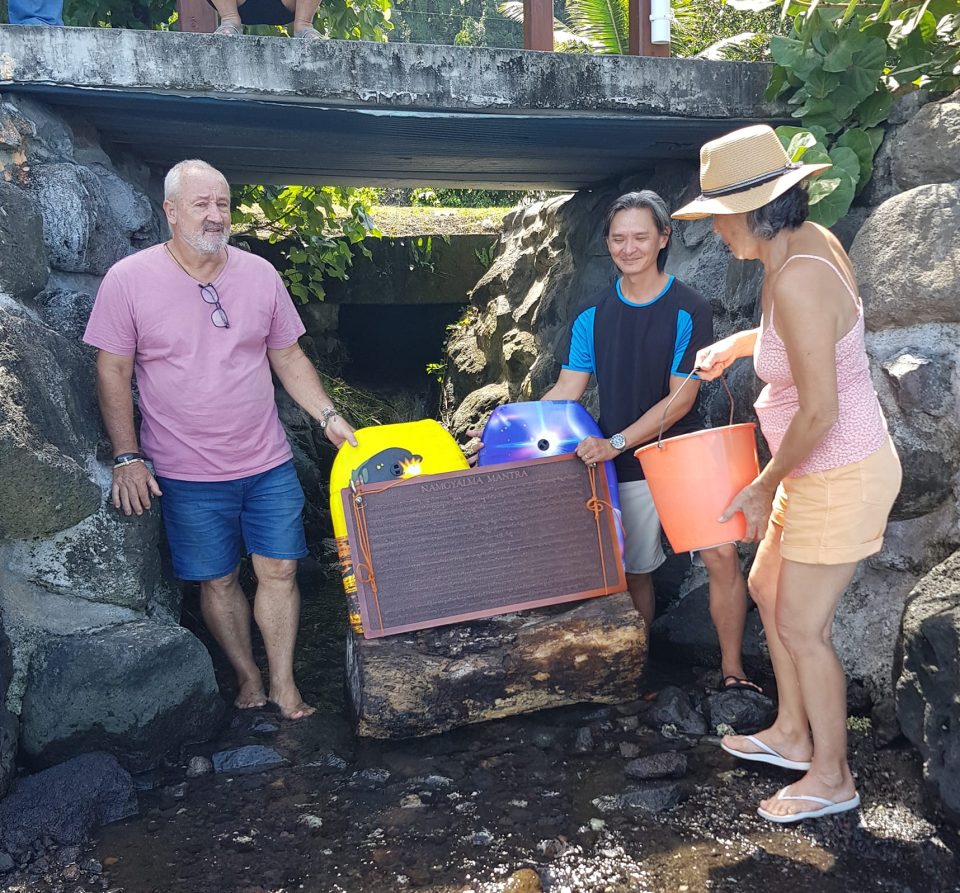
Blessing of animals in the water with Namgyalma board, Naropa Meditation Center, Tahiti, France, April 13, 2024. Photo by Bouddhisme Tahiti – Centre de Méditation Naropa, affilié à la FPMT.
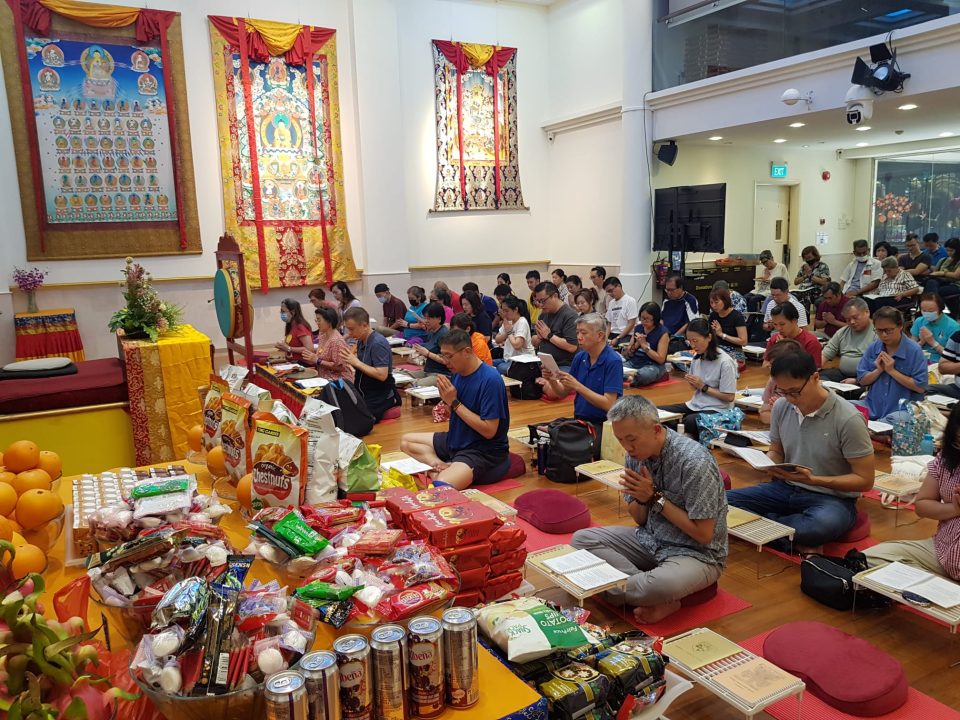
Students filled Amitabha Buddhist Centre’s gompato commemorate the first anniversary of Lama Zopa Rinpoche showing the aspect of passing away, with Lama Chopa and recitation of Chanting the Names of Noble Manjushri, April 13, 2024. Photo by Amitabha Buddhist Centre.
May all of this powerful activity be the cause for
Lama Zopa Rinpoche’s swift return!
Lama Zopa Rinpoche (1945-2023) was the spiritual director of the Foundation for the Preservation of Mahayana Tradition (FPMT), a Tibetan Buddhist organization dedicated to the transmission of the Mahayana Buddhist tradition and values worldwide through teaching, meditation and community service.
- Tagged: anniversary of the guru passing
12
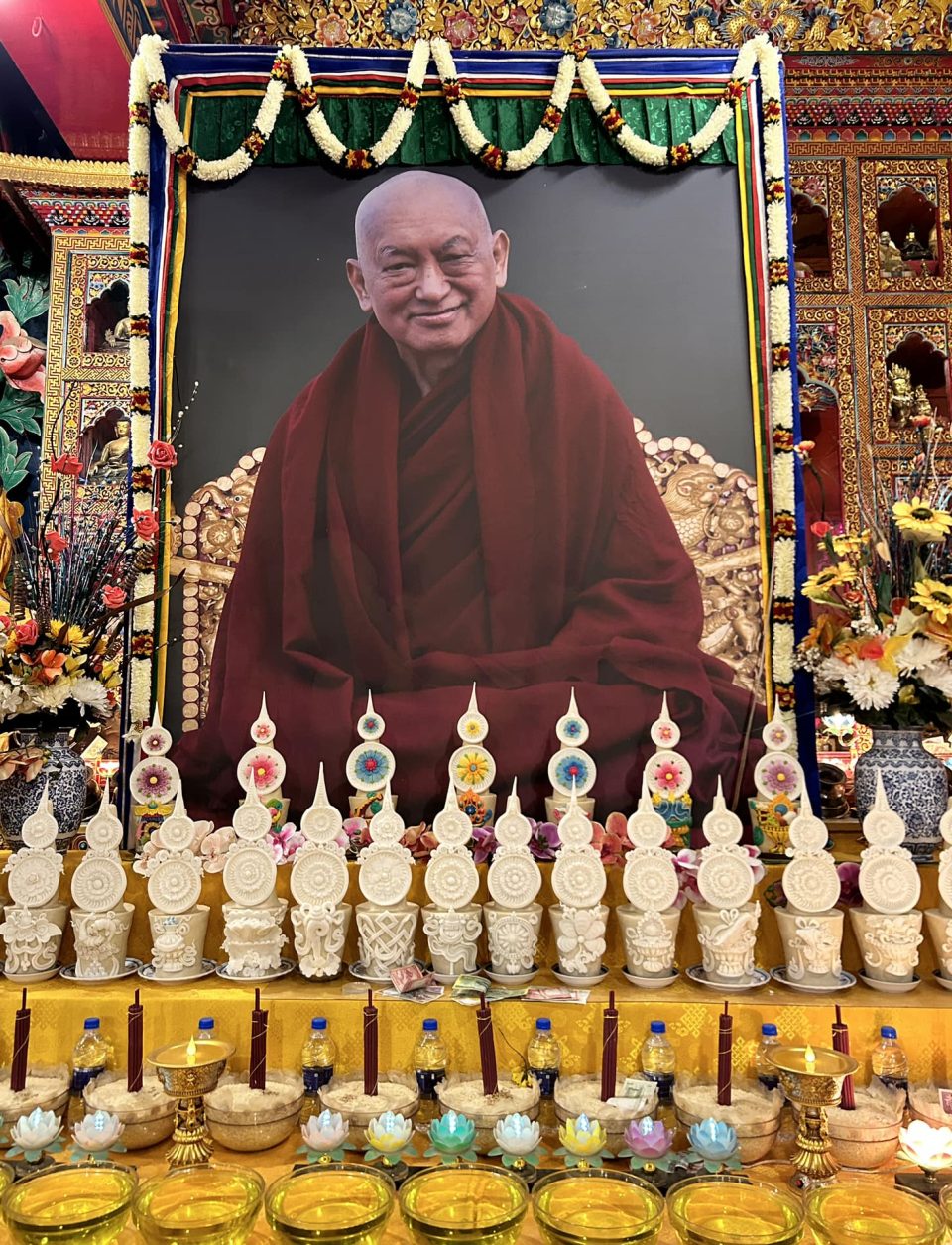
Image of Lama Zopa Rinpoche on the altar in Kopan Monastery Gompa, April 12, 2024. Photo by Kopan Monastery
The commemoration event at Kopan Monastery honoring the anniversary of Lama Zopa Rinpoche showing the aspect of passing away has begun.
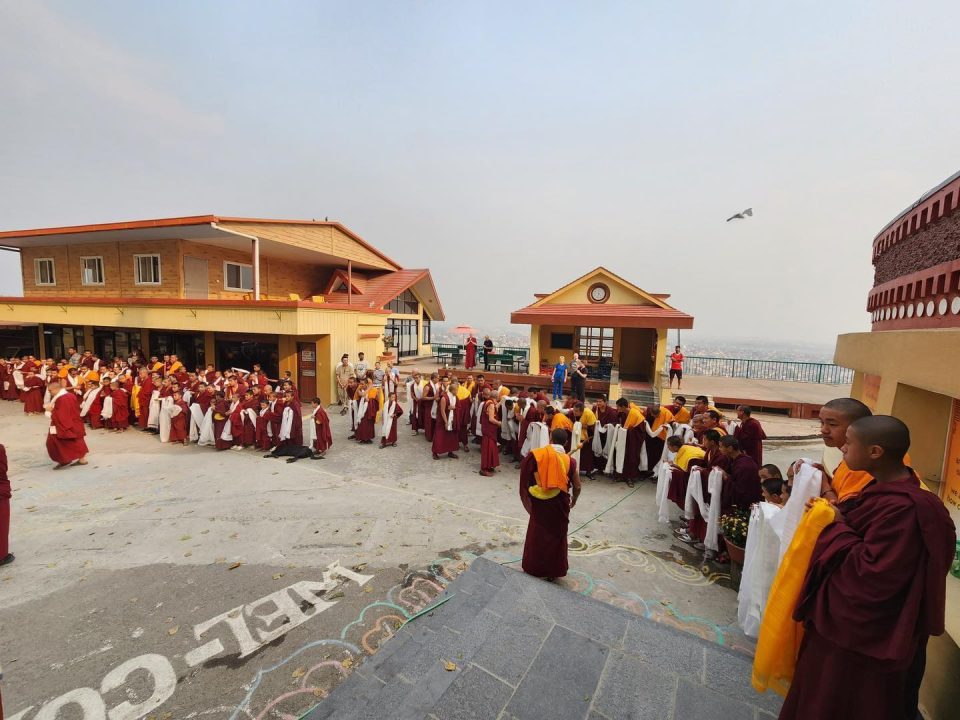
Welcoming of one of the many high lamas who have arrived at Kopan for the commemoration honoring the anniversary of Lama Zopa Rinpoche showing the aspect of passing away. Photo by Kopan Monastery.
Those in attendance so far include His Eminence the 104th Ganden Tripa; Abbots from Sera Je, Sera Mey, and Segyud Monasteries; Kusho Tengye; Khenrinpoche Geshe Chonyi; Yangsi Rinpoche; Namgyal Rinpoche; Kopan Geshes, Lama Gyupas, and many other monks and nuns; as well as Western students, some members of the FPMT Inc. Board of Directors, representatives from FPMT International Office, and many other local and international friends. Many others are expected to arrive tomorrow with an anticipated 1,200 participants joining throughout the commemoration.
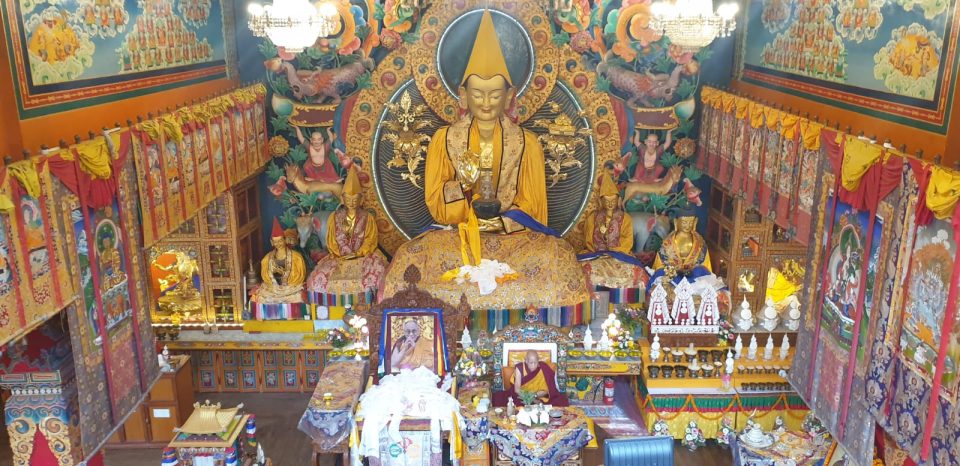
Ganden Tri Rinpoche presiding the Yamantaka self-initiation earlier today. Photo by Francois Lecointre.
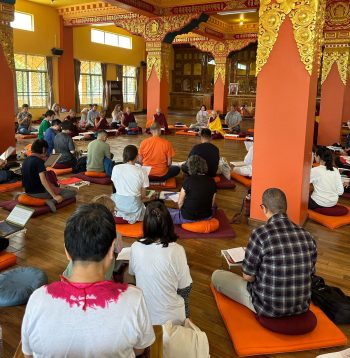
Westerners reciting prayers for Rinpoche’s swift return at Kopan Monastery, April 12. Photo courtesy of Kopan Monastery.
- Today, April 12, Yamantaka thirteen deities self-initiation was offered in the main gompa along with Chanting the Names of Noble Manjushri and supplemental prayers at the Chenrezig gompa, and Guyasamaja root tantra was recited in the main gompa by the Kopan monks and nuns.
- April 13 begins with Heruka Lama Chopa and Tsog Offering puja in the main gompa at 8:30 am which will continue after lunch. Guyasamaja root tantra will again be recited in the evening.
- On April 14 Vajrayogini self-initiation will be offered at 1 pm.
- The Heart Sutra Retreat begins on April 15 with commentary by His Eminence the 104th Ganden Tripa and meditations led by Ven. Steve Carlier.
Please check the Kopan Monastery Facebook page for any livestreams of events available.
Prayers and practices are available to download here:
We also rejoice that, around the world, FPMT centers and students are organizing prayers and offerings in observation of the anniversary of Lama Zopa Rinpoche showing the aspect of passing away. As Rinpoche explained in the foreword of the text, Advice for the Anniversary of the Guru’s Passing Away, “Making offerings on the death anniversary of a guru is an incredible practice in that it brings about the greatest purification of negative karma and collects the most extensive merit.”
May all of this sincere practice from students and accumulated merit be the cause for the swift return of our most precious guru, Lama Zopa Rinpoche.
Lama Zopa Rinpoche (1945-2023) was the spiritual director of the Foundation for the Preservation of Mahayana Tradition (FPMT), a Tibetan Buddhist organization dedicated to the transmission of the Mahayana Buddhist tradition and values worldwide through teaching, meditation and community service.
- Tagged: anniversary of the guru passing
9
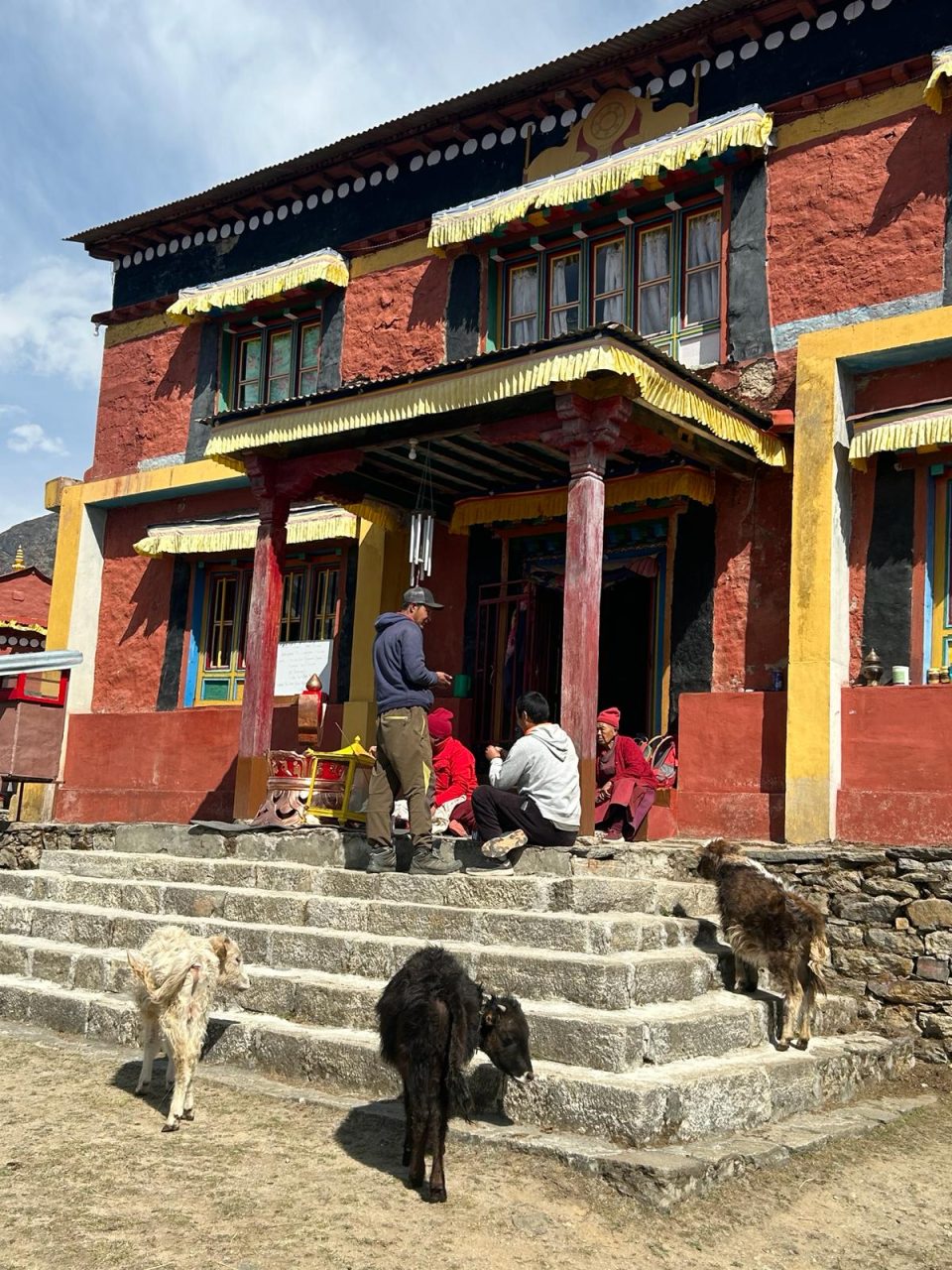
Preparations underway at Lawudo, painting and filling the life-size Kalachakra statue. Photo by Jane Seidlitz
Ven. Sarah Thresher shares an update from Lawudo on the upcoming preparations for observing the anniversary of Lama Zopa Rinpoche showing the aspect of passing away.
It is nearly one year since the passing of our most precious guru, Lama Zopa Rinpoche, and up at Lawudo preparations for the ceremony are well underway.
Last year, Ven Nyima Tashi, a relative of Rinpoche’s, flew up in a helicopter bringing the magnificent life-size Kalachakra statue that Rinpoche commissioned for the Guru Rinpoche pure land, Zangdog Palri, to be built at Lawudo in the future, and over the past few days monks from Thame Monastery have been rolling the mantras, assembling the ingredients and filling the statue in accordance with the traditional texts. Rinpoche told Merry Colony some time ago that placing this statue at Lawudo would be a cause for the success of the FPMT organization. The statue was consecrated Friday, April 5.
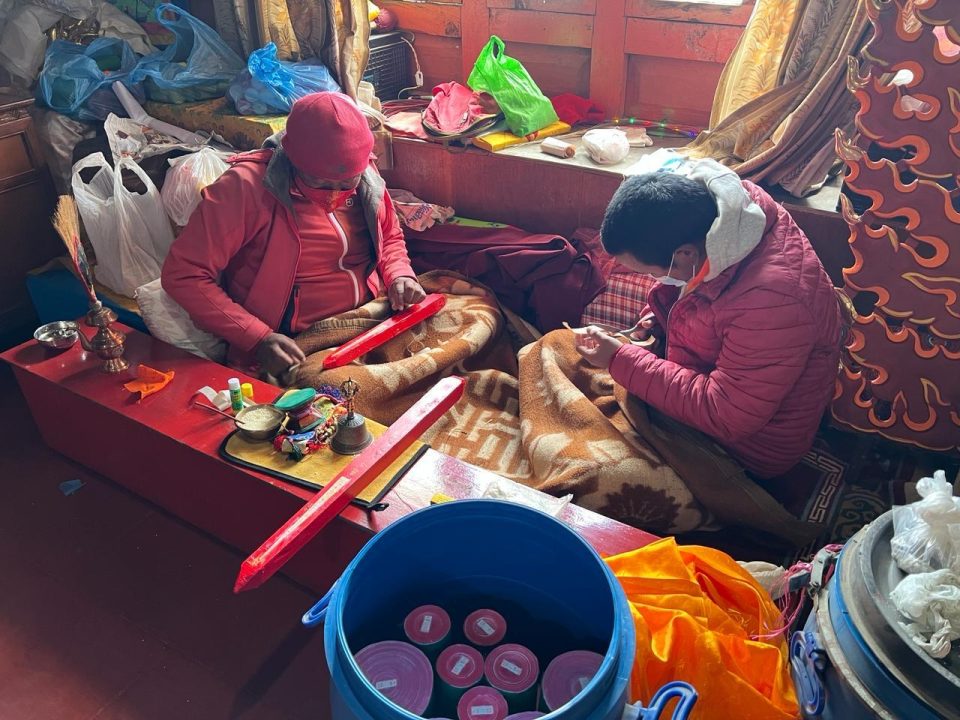
Charok Tenzin Tinley Rinpoche and artist Khapa Pema preparing the substances to fill the Kalachakra statue. Photo by Jane Seidlitz.
Meanwhile, Rinpoche’s sister Anila Ngawang Samten and the whole Lawudo family are busy preparing for a two-day puja to commemorate the one-year anniversary of Lama Zopa Rinpoche’s passing on the 12th and 13th April. Anila takes the future of the FPMT organization very seriously. She has invited the main three Nyingma masters of the Valley—Thame Rinpoche, Kyarok Lama, and Charok Tenzin Tinley Rinpoche, along with other monks and ngakpas, to perform these ceremonies, beginning with a fortune-hooking ritual and followed by the main Vajrasattva puja. These are the same lamas who helped with the consecration of Rinpoche’s new Victory Stupa constructed by Anila and Nyima Tashi last year, as well as the new relic stupa, the renovated Lawudo Lama stupa, and the Amogapasha thangka at White Cliff above Lawudo. The anniversary pujas are being dedicated for the FPMT organization to be of continual benefit to sentient beings and to fulfill all the holy wishes of our most kind and precious guru, Lama Zopa Rinpoche, and especially for us to be able to meet Rinpoche’s new unmistaken manifestation as quickly as possible.
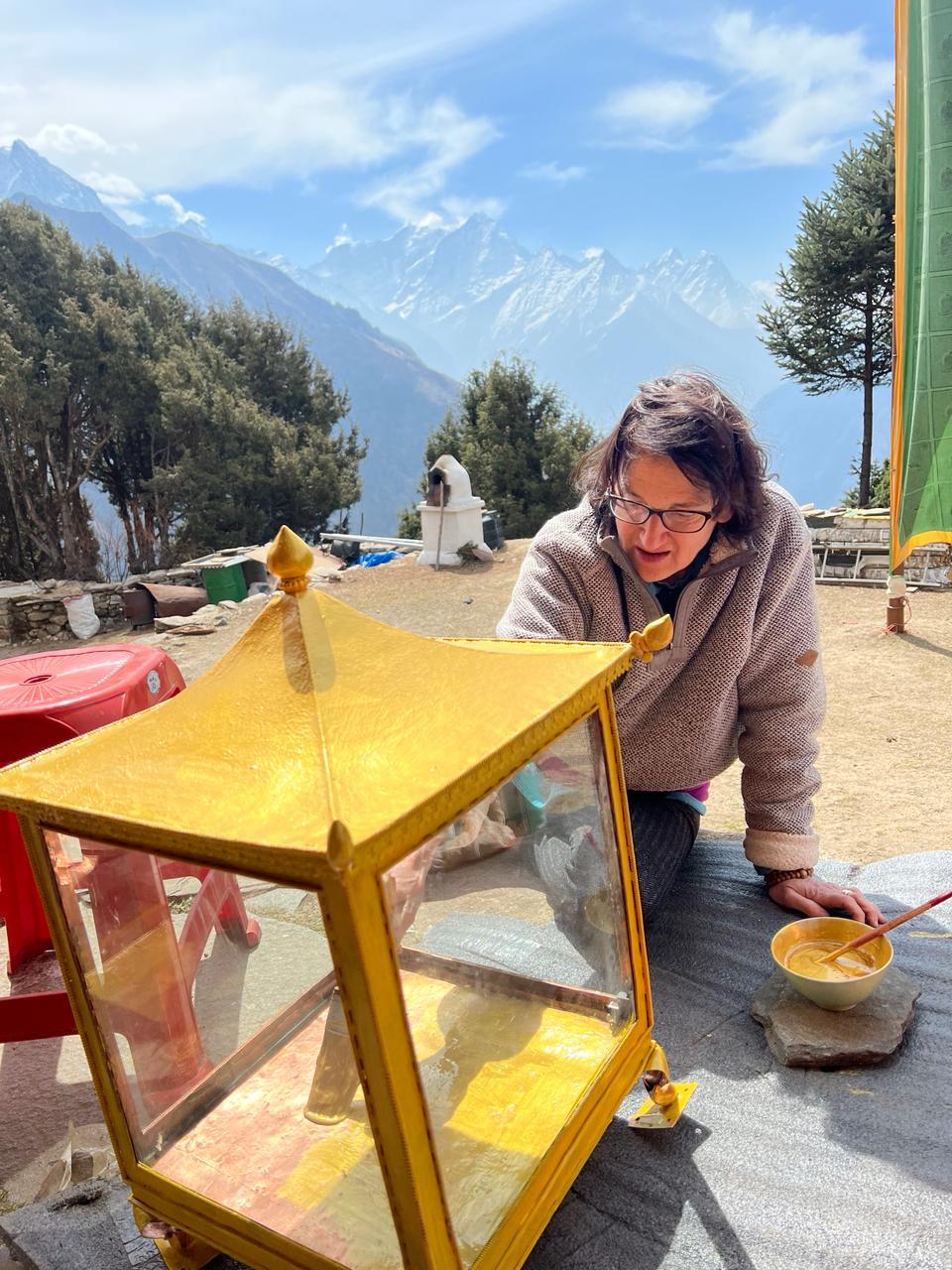
Jane Seidlitz painting the house for Rinpoche’s tooth relic stupa.
In addition to all of this, there is the Lawudo Anniversary Pilgrimage! Following the anniversary ceremonies and Heart Sutra retreat at Kopan in April, a group of over thirty pilgrims from around the world, ordained sangha and lay students, will embark on the first ever Lawudo pilgrimage—visiting holy sites connected with the first Lawudo Lama as well as Rinpoche’s most recent manifestation—rejoicing in the practice, spiritual accomplishments, qualities and enlightened activities of these two great holy beings as well as praying sincerely from the heart for the swift return of a new emanation to continue the work of upholding and spreading the pure Dharma teachings in all ten directions and benefitting numberless sentient beings.
All in all, it will be a very busy, intensive and we hope successful month long celebration of the greatness of our spiritual guide, the Lawudo Lama.
Please join the entire FPMT community in rejoicing in these auspicious activities occurring at Lawudo this week. Please also read about the prayers and pujas happening at Kopan Monastery during this time, and download practice materials for your own use.
- Tagged: anniversary of the guru passing, lawudo
5
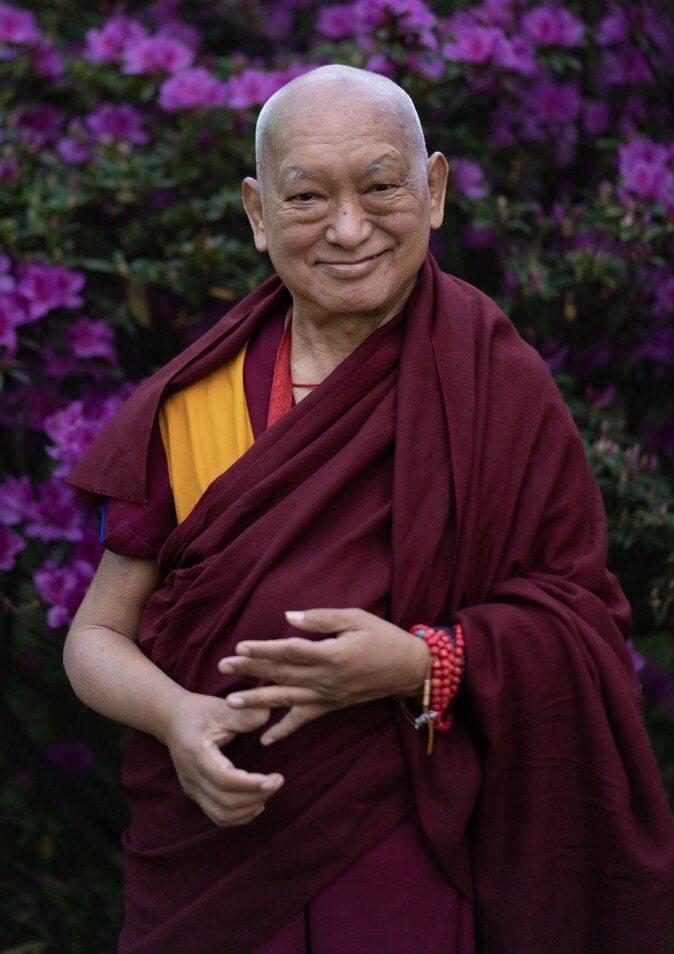
Lama Zopa Rinpoche in Nepal, March 27, 2023. Photo by Ven. Lobsang Sherab.
April 13, 2024 marks the one-year anniversary of Lama Zopa Rinpoche showing the aspect of passing away.
As a reminder to students, Advice for the Anniversary of the Guru’s Passing Away is a short text translated by Rinpoche that explains the importance of making offerings on the anniversary of the passing away of one’s guru. It sets out the benefits of making offerings, how to make the offerings with six remembrances, and how to offer and dedicate the roots of virtue collected. Rinpoche specifically wanted to translate this text for the anniversary of Lama Yeshe’s passing, and it was a text that he wanted available for quite some time. We mention this to emphasize how important Rinpoche felt it was to offer these practices on the anniversary of the guru’s passing, for example, doing Lama Chopa and Tsog Offering as Rinpoche said in the Foreword.
A commemoration will occur at Kopan Monastery on April 13, where they will offer Heruka Lama Chopa and Tsog Offering puja, Chanting the Names of Noble Manjushri, and other prayers. The puja is being sponsored by FPMT International Office on behalf of the entire FPMT organization. Kopan Monastery reports that this puja will be livestreamed, those interested in joining should pay attention to the Kopan Facebook page for this, and we will also share this information once we have it.
These prayers and practices are available to download here:
In addition to the commemoration, on April 12th, Senior Sangha members and FPMT students will engage Yamantaka self-initiation; and on April 14th, Rinpoche’s students and Sangha members from various centers and organizations will gather for Vajrayogini self-initiation.
As Rinpoche explains in the foreword of the text, Advice for the Anniversary of the Guru’s Passing Away, “Making offerings on the death anniversary of a guru is an incredible practice in that it brings about the greatest purification of negative karma and collects the most extensive merit.”
28
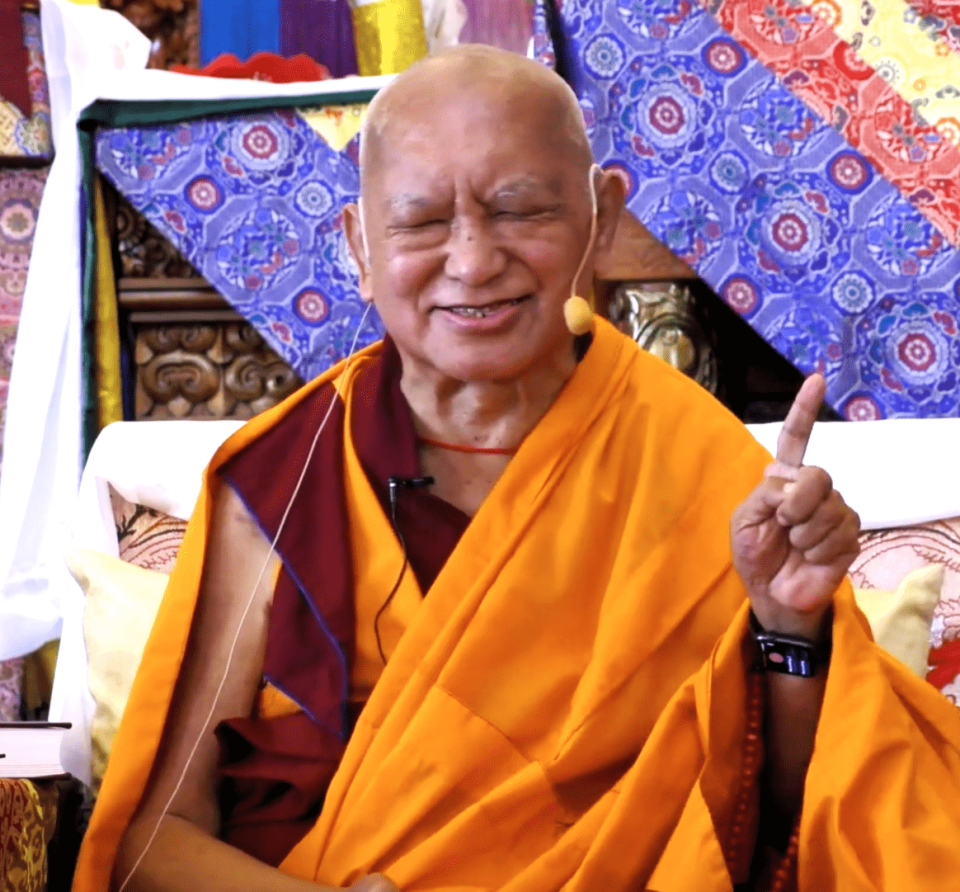
Lama Zopa Rinpoche teaching at Kopan Monastery, April 8, 2023.
Lama Zopa Rinpoche offered four teachings at Kopan Monastery on April 7, 8, and 9 before leaving for Tsum Valley on April 10. As we now all know, Rinpoche showed the aspect of passing away on April 13, and as such, these teachings are particularly precious as they are the last organized and recorded teachings Rinpoche offered in this life.
Today we are sharing advice that was offered by Rinpoche on April 9 during his longer teaching, and excerpted in two parts for inclusion in our 2023 Annual Review. This essential, clear advice is particularly meaningful to those offering service within the FPMT organization.
The One Answer is to Practice Lamrim
If you want to make your life really fruitful, really meaningful, the one answer is to practice lamrim. Otherwise, your life is spent in hallucination. There are many different levels of hallucination. Your life is spent in distraction, with attachment and anger, but especially with attachment. Like that, your life is spent in hallucination. …
Even if you’re working, even if you have to do a job to make money, your motivation should be to benefit sentient beings, to serve sentient beings. Do you understand?
You should be humble and respectful with your body, speech, and mind. You should be kind to everyone, even those who criticize or harm you. You should be kind, polite, and serve others with your body and speech.
It makes people so happy when you speak politely to them. With holy objects, you have a mind of devotion, but with sentient beings, you should have compassion.
The Quickest Way to Enlightenment
The guru is more precious than Buddha Vajradhara.
The guru is the creator, the doer, who manifests the numberless buddhas. This is mentioned in the tantric teachings. When you receive teachings in the future from someone with whom you have a guru-disciple relationship, this is the meditation that you should do. You are receiving the teaching or initiation from all the buddhas. You are also receiving it from your special deity. Do you understand?
You have to have that understanding. It is so precious, so precious, so precious. It is similar when you are making offerings or offering service. You are making offering or offering service to the one who is more special than all the buddhas, more special than even your own deity.
You have to keep all that in your mind; you have to keep it in your diarrhea book [Rinpoche often jokingly referred to a students’ Dharma journal for notes, quotations, and teachings as their “diarrhea book”]. I have just mentioned the essence of the practice of guru yoga. It is mentioned very clearly in the long Six-Session Yoga. Even if you are offering a meal, tea, water, or a candy, since the numberless atoms of the guru’s holy body are all the buddhas, it means you are offering to numberless buddhas.
Even in each atom there are numberless buddhas. Whatever it is—you’re offering service, receiving teachings or advice or a scolding—it is all the buddhas; it comes from all the buddhas, so, from your mind-seal deity.
So, that is the guru yoga practice, and that is the reality.
Through that, you then receive the blessings of the guru; then through that, you achieve enlightenment.
Okay, thank you. Thank you very much. I’m not advertising that I’m buddha. I’m not saying that.
Generally, this is how you should think in the future, okay. Yes, for you, your guru is more precious than the numberless buddhas, more precious than your own deity. That is so important.
Think this with everything: with every offering and offering of service, with receiving advice. It’s so important. You then collect the highest merit and experience the greatest purification. Do you understand?
This is the quick way to achieve enlightenment.
Transcribed and subsequently edited by Ven. Ailsa Cameron from the audio recording of Lama Zopa Rinpoche’s April 9, 2023 teaching at Kopan Monastery. Excerpted for inclusion in the 2023 Annual Review by FPMT International Office.
Lama Zopa Rinpoche (1945-2023) was the spiritual director of the Foundation for the Preservation of Mahayana Tradition (FPMT), a Tibetan Buddhist organization dedicated to the transmission of the Mahayana Buddhist tradition and values worldwide through teaching, meditation and community service.
27
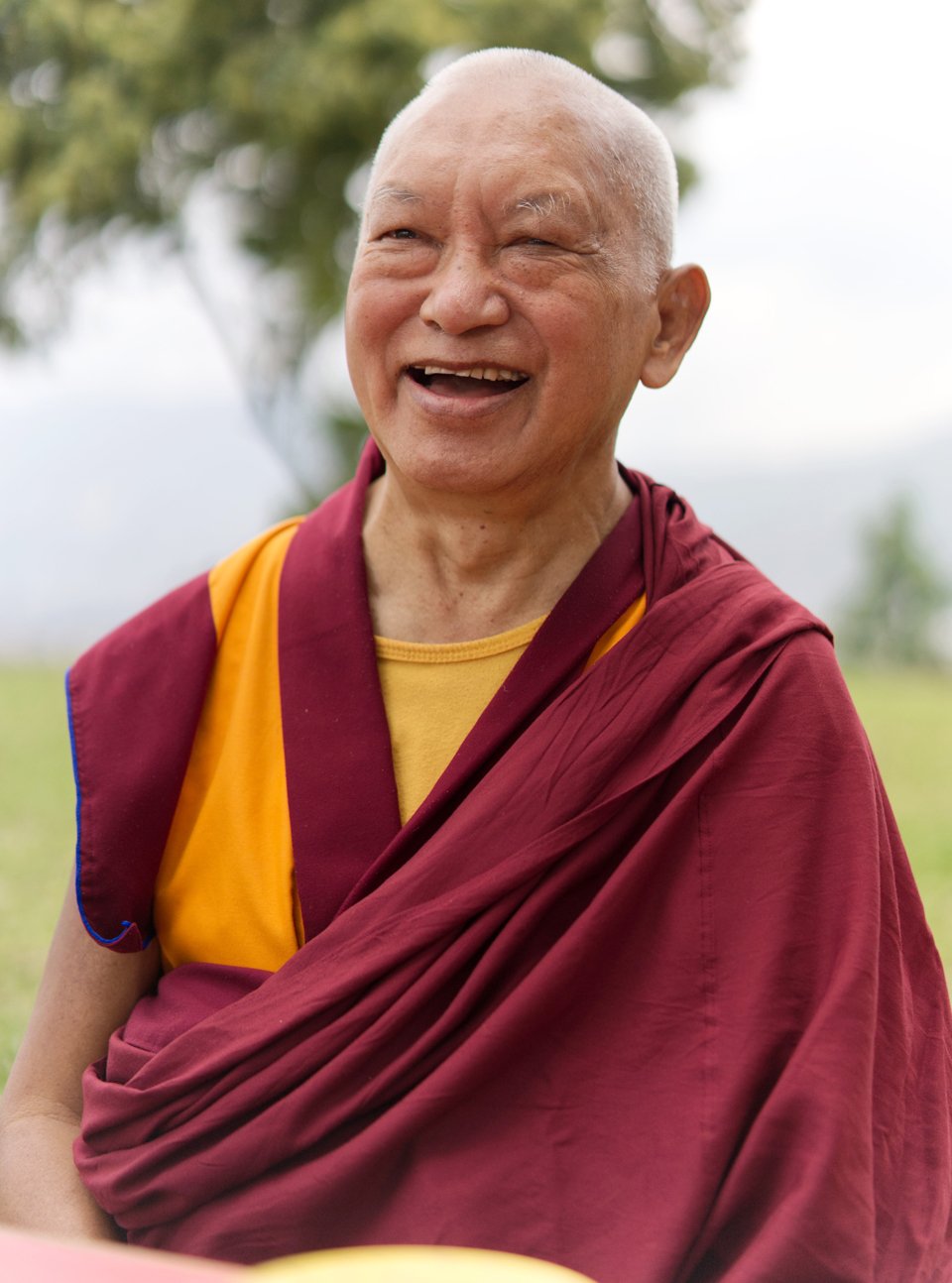
Lama Zopa Rinpoche on top of Kopan Hill, Kopan Monastery, Nepal, May 2020. Photo by Ven. Lobsang Sherab.
We recently shared news that Lama Zopa Rinpoche’s newest volume from Wisdom Publications, Perseverance: The Determination of the Bodhisattva is available.
Today we offer you a chapter from this book made available from Wisdom titled “Overcoming Laziness.” In this transformative chapter, Rinpoche offers invaluable insights and practical guidance on how to overcome laziness, which he explains is the greatest obstacle to happiness.
The Three Types of Laziness
Laziness, the antithesis of perseverance, is the devil that most interferes with transforming the mind and, therefore, it is the greatest obstacle to happiness. There are three types of laziness:
1. The laziness of procrastination
2. The laziness of being attached to worldly affairs
3. The laziness of discouragement
Of this Shantideva says,
7.2b And what are the adversaries of fortitude?
They are indolence, a fondness for evil, and despondency and self-deprecation.
The first laziness, the laziness of procrastination or indolence, blocks our energy for Dharma practice and causes us to waste time with distractions. This kind of laziness comes about as a result of lacking the understanding of the nature of samsara, the cause of suffering, and the evolution of karma. The second type, being attached to worldly affairs, is the worst form of laziness, the laziness that draws us to engage in negative actions of greed, ignorance, and hatred—actions that are the opposite of Dharma practice. The third type of laziness, discouragement or despondency, causes us to not do positive things with the excuse that we are unable to do them. This is the mind that thinks, “It’s beyond my capabilities.” The less lazy we are, the fewer hindrances to meditation we will experience.
Spending all day and all night working for samsaric comforts is considered laziness from the Dharma point of view. Because we don’t remember our past sufferings or know those that lie ahead, we work hard for ignorance and greed; we are lazy in that way.
Milarepa said that by having generated impermanence, he was able to conquer “the devil, laziness,” and then whatever action he did became the Dharma. Highly realized beings, such as Lama Tsongkhapa, are utterly without laziness. Without talking about all the other unimaginable great actions they do, because of their bodhichitta, even just breathing becomes great work for other sentient beings.
Continue reading Lama Zopa Rinpoche’s full chapter on “Overcoming Laziness.”
Learn more about Perseverance: The Determination of the Bodhisattva from Wisdom Publications and order your copy today:
wisdomexperience.org/product/perseverance
Lama Zopa Rinpoche (1945-2023) was the spiritual director of the Foundation for the Preservation of Mahayana Tradition (FPMT), a Tibetan Buddhist organization dedicated to the transmission of the Mahayana Buddhist tradition and values worldwide through teaching, meditation and community service.
21
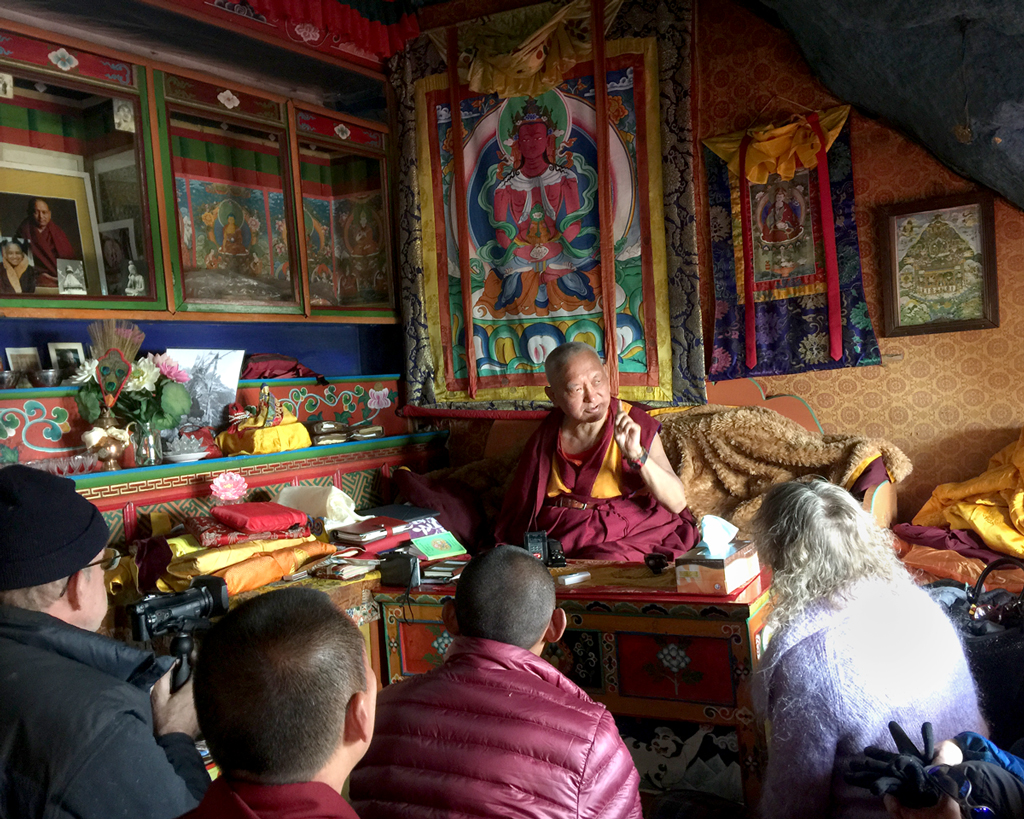
Lama Zopa Rinpoche talking about the previous Lawudo Lama in his meditation cave, Lawudo, Solu Khumbu, Nepal, April 2015. Photo by Ven. Roger Kunsang.
In a talk given to a few students in the Lawudo cave in 2015, Lama Zopa Rinpoche shared details of his early life. The Lawudo cave is the location where Rinpoche, in his past life as the Lawudo Lama Kunsang Yeshe, spent the last 30 years of his life in intensive meditation retreat. Rinpoche also shares some information about this holy cave.
We invite you to watch this joyful and intimate video, filmed by Bill Kane:
As a reminder, the anniversary of Rinpoche showing the aspect of passing away is approaching on April 13. You can find resources for observing this special date, and learn more about the commemoration activities being offered at Kopan Monastery during this time.
You can read a moving eulogy of Rinpoche’s life, which also shares details of his early life and connection to Lawudo.
The Lawudo Lama by Jamyang Wangmo tells the story the Lawudo Lama Kunzang Yeshe as well as offers a detailed description of the religious and cultural history of the Mount Everest region, where Lawudo is situated.
Lama Zopa Rinpoche (1945-2023) was the spiritual director of the Foundation for the Preservation of Mahayana Tradition (FPMT), a Tibetan Buddhist organization dedicated to the transmission of the Mahayana Buddhist tradition and values worldwide through teaching, meditation and community service.
- Tagged: lama zopa rinpoche, lawudo, lawudo lama, lawudo retreat centre
18

Lama Zopa Rinpoche teaching at the 4 Kadampa Deities Retreat, Institut Vajra Yogini, France, 2003. Photo by Ven. Kunsang Thubten.
Recently we shared the addition to our Rinpoche Available Now page of Lama Zopa Rinpoche’s 2003 twenty-three part teachings from a Four Kadampa Deities Retreat offered at Institut Vajra Yogini, France. The retreat focused on the four Kadampa deities, however, Rinpoche taught on a broad range of lamrim topics.
Today we wanted to bring to your attention teaching #5 in this series, “Enlightenment through Compassion.”
In this teaching, Rinpoche began by discussing the importance of helping young people and expresses a sense of urgency for Universal Education as a method that can bring peace to individuals and the world, regardless of their religious background. By fostering compassion, wisdom, and good conduct, individuals can bring peace not only to themselves and their families but also to their countries, the world, and all sentient beings.
Rinpoche discussed the power of generating compassion toward even a single sentient being by sharing the story of Getsul Tsembulwa, a disciple of the great yogi Nakpo Chopawa, encountering a woman with leprosy who needed help crossing a river. This story shows how compassion toward even one sentient being can lead to enlightenment. The stronger the compassion, the quicker the path to enlightenment becomes. By giving up one’s life and sacrificing for the welfare of another, heavy negative karma is purified, allowing one to see the true nature of the deity. Generating compassion toward even one sentient being can make that being the most kind and precious person in one’s life. Generating compassion leads to bodhichitta, which is the root of the Mahayana path of enlightenment. Once enlightened, one can liberate countless sentient beings from samsaric suffering and bring them to enlightenment, thus continuously benefiting others.
Rinpoche stressed that it is important to practice holy Dharma throughout life, as death is certain and only holy Dharma can guide one at that crucial moment. Rinpoche advises keeping the mind in the lamrim, the stages of the path to enlightenment, and engaging in virtuous actions aligned with the teachings. By doing so, every aspect of life becomes meaningful and contributes to one’s progress toward liberation and enlightenment.
At the end of Rinpoche’s talk, he delves into meditation on emptiness.
We invite you to watch this full video and engage with a lightly edited version of this teaching which is available from the Lama Yeshe Wisdom Archive.
As a reminder, this entire retreat is now available for students to explore as they wish.
Foundation for the Preservation of Mahayana Tradition (FPMT), is a Tibetan Buddhist organization dedicated to the transmission of the Mahayana Buddhist tradition and values worldwide through teaching, meditation and community service.
- Home
- News/Media
- Study & Practice
- About FPMT Education Services
- Latest News
- Programs
- New to Buddhism?
- Buddhist Mind Science: Activating Your Potential
- Heart Advice for Death and Dying
- Discovering Buddhism
- Living in the Path
- Exploring Buddhism
- FPMT Basic Program
- FPMT Masters Program
- FPMT In-Depth Meditation Training
- Maitripa College
- Lotsawa Rinchen Zangpo Translator Program
- Universal Education for Compassion & Wisdom
- Online Learning Center
- Prayers & Practice Materials
- Overview of Prayers & Practices
- Full Catalogue of Prayers & Practice Materials
- Explore Popular Topics
- Benefiting Animals
- Chenrezig Resources
- Death & Dying Resources
- Lama Chopa (Guru Puja)
- Lama Zopa Rinpoche: Compendium of Precious Instructions
- Lama Zopa Rinpoche: Life Practice Advice
- Lama Zopa Rinpoche Practice Series
- Lamrim Resources
- Mantras
- Prayer Book Updates
- Purification Practices
- Sutras
- Thought Transformation (Lojong)
- Audio Materials
- Dharma Dates – Tibetan Calendar
- Translation Services
- Publishing Services
- Teachings and Advice
- Find Teachings and Advice
- Lama Zopa Rinpoche Advice Page
- Lama Zopa Rinpoche: Compendium of Precious Instructions
- Lama Zopa Rinpoche Video Teachings
- ༧སྐྱབས་རྗེ་བཟོད་པ་རིན་པོ་ཆེ་མཆོག་ནས་སྩལ་བའི་བཀའ་སློབ་བརྙན་འཕྲིན།
- Podcasts
- Lama Yeshe Wisdom Archive
- Buddhism FAQ
- Dharma for Young People
- Resources on Holy Objects
- Ways to Offer Support
- Centers
- Affiliates Area
- Teachers
- Projects
- Charitable Projects
- Make a Donation
- Applying for Grants
- News about Projects
- Other Projects within FPMT
- Support International Office
- Projects Photo Galleries
- Give Where Most Needed
- FPMT
- Shop
Translate*
*powered by Google TranslateTranslation of pages on fpmt.org is performed by Google Translate, a third party service which FPMT has no control over. The service provides automated computer translations that are only an approximation of the websites' original content. The translations should not be considered exact and only used as a rough guide.I want to say without hesitation that the purpose of our life is happiness.







